
List of United States Senators from Connecticut
Encyclopedia
This is a chronological listing of the United States Senators from Connecticut.
United States Senators
are popularly elected, for a six year term, beginning January 3. Elections are held the first Tuesday after November 1st. Before 1914, they were chosen by the Connecticut General Assembly
, and before 1935, their terms began March 4.
belong to the electoral cycle that were elected for only the 1st United States Congress
in the first election of 1788 and whose seats in recent years are contested in 1994
, 2000
, 2006
, and 2012
.
belong to the electoral cycle that were elected to the first three U.S. Congresses in the first election of 1788 and whose seats in recent years are contested in 1998
, 2004
, 2010
, and 2016.
United States Senators
United States Senate
The United States Senate is the upper house of the bicameral legislature of the United States, and together with the United States House of Representatives comprises the United States Congress. The composition and powers of the Senate are established in Article One of the U.S. Constitution. Each...
are popularly elected, for a six year term, beginning January 3. Elections are held the first Tuesday after November 1st. Before 1914, they were chosen by the Connecticut General Assembly
Connecticut General Assembly
The Connecticut General Assembly is the state legislature of the U.S. state of Connecticut. It is a bicameral body composed of the 151-member House of Representatives and the 36-member Senate. It meets in the state capital, Hartford. There are no term limits for either chamber.During...
, and before 1935, their terms began March 4.
Class 1
Class 1 SenatorsClasses of United States Senators
The three classes of United States Senators are currently made up of 33 or 34 Senate seats. The purpose of the classes is to determine which Senate seats will be up for election in a given year. The three groups are staggered so that one of them is up for election every two years.A senator's...
belong to the electoral cycle that were elected for only the 1st United States Congress
1st United States Congress
-House of Representatives:During this congress, five House seats were added for North Carolina and one House seat was added for Rhode Island when they ratified the Constitution.-Senate:* President: John Adams * President pro tempore: John Langdon...
in the first election of 1788 and whose seats in recent years are contested in 1994
United States Senate elections, 1994
The U.S. Senate election, 1994 was an election held on November 8, in which the Republican Party was able to take control of the Senate from the Democrats. In a midterm election, the opposition Republicans held the traditional advantage...
, 2000
United States Senate elections, 2000
In 2000, elections for one-third of the seats in the United States Senate occurred In 2000, elections for one-third of the seats in the United States Senate occurred In 2000, elections for one-third of the seats in the United States Senate occurred (they coincided with the election of George W....
, 2006
United States Senate elections, 2006
Elections for the United States Senate were held on November 7, 2006, with 33 of the 100 seats in the United States Senate being contested. Senators are elected for six-year terms, with one third of the Senate seats up for a vote every two years. The term of office for those elected in 2006 runs...
, and 2012
United States Senate elections, 2012
Elections to the United States Senate are to be held on November 6, 2012, with 33 of the 100 seats in the Senate being contested in regular elections whose winners will serve six-year terms from January 3, 2013 until January 3, 2019. Additionally, special elections may be held to fill vacancies...
.
| # | Senator | Party | Years | Congress | Term | Electoral history |
|---|---|---|---|---|---|---|
| 1 |  Oliver Ellsworth Oliver EllsworthOliver Ellsworth Oliver Ellsworth was an American lawyer and politician, a revolutionary against British rule, a drafter of the United States Constitution, and the third Chief Justice of the United States. While at the Federal Convention, Ellsworth moved to strike the word National from the motion made by Edmund... |
Pro- Administration Pro-Administration Party (United States) Pro-Administration "Party" is a term by historians to describe the supporters of the policies of George Washington's administration — especially Treasury Secretary Alexander Hamilton's financial policies — prior to the formation of the Federalist and Democratic-Republican Parties.Almost the entire... |
March 4, 1789 – March 8, 1796 |
1 1st United States Congress -House of Representatives:During this congress, five House seats were added for North Carolina and one House seat was added for Rhode Island when they ratified the Constitution.-Senate:* President: John Adams * President pro tempore: John Langdon... |
1 | Elected in 1788/1789 United States Senate elections, 1788 The United States Senate election of 1788 were the first elections for the United States Senate, which coincided with the election of President George Washington... |
| 2 2nd United States Congress -House of Representatives:During this congress, two new House seats were added for each of the new states of Vermont and Kentucky. -Leadership:-Senate:*President: John Adams *President pro tempore:** Richard Henry Lee... |
2 | Re-elected in 1791 Resigned to become Chief Justice of the United States Chief Justice of the United States The Chief Justice of the United States is the head of the United States federal court system and the chief judge of the Supreme Court of the United States. The Chief Justice is one of nine Supreme Court justices; the other eight are the Associate Justices of the Supreme Court of the United States... |
||||
| 3 3rd United States Congress The Third United States Congress was a meeting of the legislative branch of the United States federal government, consisting of the United States Senate and the United States House of Representatives... |
||||||
| 4 4th United States Congress -House of Representatives:- Senate :* President: John Adams * President pro tempore:** Henry Tazewell , first elected December 7, 1795** Samuel Livermore , first elected May 6, 1796** William Bingham , first elected February 16, 1797... |
||||||
| Vacant | March 8, 1796 – December 6, 1796 |
|||||
| 2 | 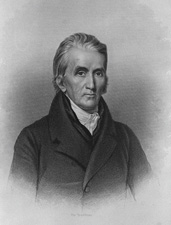 James Hillhouse James HillhouseJames Hillhouse James Hillhouse was an American lawyer, real estate developer, and politician from New Haven, Connecticut. He represented Connecticut in both the U.S. House and Senate... |
Federalist Federalist Party (United States) The Federalist Party was the first American political party, from the early 1790s to 1816, the era of the First Party System, with remnants lasting into the 1820s. The Federalists controlled the federal government until 1801... |
December 6, 1796 – June 10, 1810 |
4 4th United States Congress -House of Representatives:- Senate :* President: John Adams * President pro tempore:** Henry Tazewell , first elected December 7, 1795** Samuel Livermore , first elected May 6, 1796** William Bingham , first elected February 16, 1797... (Continued) |
Elected to finish Ellsworth's term | |
| 5 5th United States Congress The Fifth United States Congress was a meeting of the legislative branch of the United States federal government, consisting of the United States Senate and the United States House of Representatives... |
3 | Re-elected in 1797 | ||||
| 6 6th United States Congress The Sixth United States Congress was a meeting of the legislative branch of the United States federal government, consisting of the United States Senate and the United States House of Representatives. It met at Congress Hall in Philadelphia, Pennsylvania and in Washington, D.C. from March 4, 1799... |
||||||
| 7 7th United States Congress - House of Representatives :-Senate:* President: Aaron Burr * President pro tempore:** Abraham Baldwin , first elected December 7, 1801** Stephen R. Bradley , first elected December 14, 1802-House of Representatives:... |
||||||
| 8 8th United States Congress - Senate :* President: Aaron Burr * President pro tempore: John Brown , October 17, 1803 – February 26, 1804** Jesse Franklin , March 10, 1804 – November 4, 1804** Joseph Anderson , January 15, 1805 – December 1, 1805- House of Representatives :... |
4 | Re-elected in 1803 | ||||
| 9 9th United States Congress - Senate :* President: George Clinton * President pro tempore: Samuel Smith - House of Representatives :* Speaker: Nathaniel Macon -Members:This list is arranged by chamber, then by state... |
||||||
| 10 10th United States Congress - House of Representatives :- Senate :*President: George Clinton *President pro tempore: Samuel Smith , elected April 16, 1808** Stephen R. Bradley , elected December 28, 1808** John Milledge , elected January 30, 1809... |
||||||
| 11 11th United States Congress - House of Representatives :-Leadership:- Senate :* President: George Clinton * President pro tempore:** John Milledge ** Andrew Gregg , elected June 26, 1809** John Gaillard , elected February 28, 1810... |
5 | Re-elected in 1809 Resigned |
||||
| Vacant | June 10, 1810 – December 4, 1810 |
|||||
| 3 |  Samuel W. Dana Samuel W. DanaSamuel W. Dana Samuel Whittlesey Dana was an American lawyer and politician from Middletown, Connecticut. He represented Connecticut in both the U.S. House of Representatives and Senate.... |
Federalist Federalist Party (United States) The Federalist Party was the first American political party, from the early 1790s to 1816, the era of the First Party System, with remnants lasting into the 1820s. The Federalists controlled the federal government until 1801... |
December 4, 1810 – March 4, 1821 |
11 11th United States Congress - House of Representatives :-Leadership:- Senate :* President: George Clinton * President pro tempore:** John Milledge ** Andrew Gregg , elected June 26, 1809** John Gaillard , elected February 28, 1810... (Continued) |
Elected to finish Hillhouse's term | |
| 12 12th United States Congress - House of Representatives :During this congress, one new House seat was added for the new state of Louisiana.- Senate :*President: George Clinton *President pro tempore: William H. Crawford -House of Representatives:*Speaker: Henry Clay... |
||||||
| 13 13th United States Congress - Senate :* President: Elbridge Gerry , until November 23, 1814, thereafter vacant.* President pro tempore: Joseph B. Varnum , December 6, 1813 – February 3, 1814** John Gaillard , elected November 25, 1814- House of Representatives :... |
||||||
| 14 14th United States Congress - Senate :* President: Vacant* President pro tempore: John Gaillard of South Carolina, first elected December 4, 1815- House of Representatives :* Speaker: Henry Clay of Kentucky-Members:This list is arranged by chamber, then by state... |
6 | Re-elected in 1814 United States Senate elections, 1814 The United States Senate election of 1814 was an election which had the Democratic-Republican Party lose two seats, but still retain an overwhelming control of, the United States Senate.... |
||||
| 15 15th United States Congress -Leadership:- Senate :* President: Daniel D. Tompkins * President pro tempore:** John Gaillard , elected March 4, 1817** James Barbour , elected February 15, 1819- House of Representatives :*Speaker: Henry Clay -Members:... |
||||||
| 16 16th United States Congress -House of Representatives:During this congress, one House seat was added for the new state of Alabama and one seat was reapportioned from Massachusetts to the new state of Maine. For the beginning of the next congress, six more seats from Massachusetts would be reapportioned to... |
||||||
| 4 | Elijah Boardman Elijah Boardman Elijah Boardman was a United States Senator from Connecticut. Born to a noted and politically connected Connecticut family, he served in the United States Army before becoming a noted merchant and businessman. Becoming involved in property and land ownership in Connecticut and Ohio, he founded the... |
Democratic- Republican Democratic-Republican Party (United States) The Democratic-Republican Party or Republican Party was an American political party founded in the early 1790s by Thomas Jefferson and James Madison. Political scientists use the former name, while historians prefer the latter one; contemporaries generally called the party the "Republicans", along... |
March 4, 1821 – August 18, 1823 |
17 17th United States Congress The Seventeenth United States Congress was a meeting of the legislative branch of the United States federal government, consisting of the United States Senate and the United States House of Representatives. It met in Washington, D.C. from March 4, 1821 to March 3, 1823, during the fifth and sixth... |
7 | Elected in 1820 United States Senate elections, 1820 The United States Senate election of 1820 was an election for the United States Senate which, corresponding with James Monroe's landslide re-election, had the Democratic-Republican Party gain seven seats, assuming almost complete control of the Senate.... Died |
| 18 18th United States Congress The Eighteenth United States Congress was a meeting of the legislative branch of the United States federal government, consisting of the United States Senate and the United States House of Representatives. It met in Washington, D.C. from March 4, 1823 to March 3, 1825, during the seventh and eighth... |
||||||
| Vacant | August 18, 1823 – October 8, 1823 |
|||||
| 5 |  Henry W. Edwards Henry W. EdwardsHenry W. Edwards Henry Waggaman Edwards was the 27th and 29th Governor of the U.S. state of Connecticut.He was born in New Haven, Connecticut, the son of Pierpont Edwards... |
Jacksonian | October 8, 1823 – March 4, 1827 |
18 18th United States Congress The Eighteenth United States Congress was a meeting of the legislative branch of the United States federal government, consisting of the United States Senate and the United States House of Representatives. It met in Washington, D.C. from March 4, 1823 to March 3, 1825, during the seventh and eighth... (Continued) |
Appointed to continue Boardman's term Elected to finish Boardman's term |
|
| 19 19th United States Congress -House of Representatives:-Leadership:- Senate :* President: John C. Calhoun * President pro tempore: John Gaillard , until December 4, 1825** Nathaniel Macon , from May 20, 1826- House of Representatives :* Speaker: John W. Taylor -Members:... |
||||||
| 6 |  Samuel A. Foot Samuel A. FootSamuel A. Foot Samuel Augustus Foot was the 28th Governor of Connecticut as well as a United States Representative and Senator. Born in Cheshire, Connecticut, he graduated from Yale College in 1797, and attended the Litchfield Law School... |
Adams, later Anti-Jacksonian |
March 4, 1827 – March 4, 1833 |
20 20th United States Congress -House of Representatives:-Leadership:- Senate :* President: John C. Calhoun * President pro tempore: Samuel Smith - House of Representatives :* Speaker: Andrew Stevenson -Members:This list is arranged by chamber, then by state... |
8 | Elected in 1826 United States Senate elections, 1826 The United States Senate election of 1826 was an election which had the majority Jacksonian coalition gain a seat in the United States Senate.As this election was prior to ratification of the seventeenth amendment, Senators were chosen by State legislatures.... Lost re-election |
| 21 21st United States Congress -House of Representatives:-Leadership:- Senate :* President: John C. Calhoun * President pro tempore: Samuel Smith - House of Representatives :* Speaker: Andrew Stevenson -Members:This list is arranged by chamber, then by state... |
||||||
| 22 22nd United States Congress -House of Representatives:-Leadership:- Senate :* President:** John C. Calhoun , resigned December 28, 1832, thereafter vacant.* President pro tempore:** Samuel Smith , first elected December 5, 1831** Littleton W... |
||||||
| 7 |  Nathan Smith Nathan SmithNathan Smith (senator) Nathan Smith was a United States Senator from Connecticut, and was the brother of Nathaniel Smith and uncle of Truman Smith. He was born in Woodbury, Connecticut and received a modest education. He read law, and was admitted to the bar in 1792 and commenced the practice of his profession in New... |
Whig Whig Party (United States) The Whig Party was a political party of the United States during the era of Jacksonian democracy. Considered integral to the Second Party System and operating from the early 1830s to the mid-1850s, the party was formed in opposition to the policies of President Andrew Jackson and his Democratic... |
March 4, 1833 – December 6, 1835 |
23 23rd United States Congress -House of Representatives:For the beginning of this congress, the size of the House was increased from 213 seats to 240 seats, following the 1830 United States Census .- Leadership :- Senate :* President: Martin Van Buren... |
9 | Elected in 1832 United States Senate elections, 1832 The United States Senate election of 1832 was an election which had the Anti-Jackson coalition assume control of the United States Senate from the Jacksonian coalition, despite Andrew Jackson's victory in the Presidential election.... Died |
| 24 24th United States Congress -House of Representatives:During this congress one House seat was added for each of the new states of Arkansas and Michigan.-Leadership:- Senate :* President: Martin Van Buren * President pro tempore: William R. King - House of Representatives :... |
||||||
| Vacant | December 6, 1835 – December 21, 1835 |
|||||
| 8 | 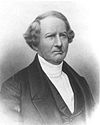 John Milton Niles John Milton NilesJohn Milton Niles John Milton Niles was a lawyer, editor, author and politician from Connecticut, serving in the United States Senate and as United States Postmaster General 1840 to 1841.... |
Jacksonian | December 21, 1835 – March 4, 1839 |
24 24th United States Congress -House of Representatives:During this congress one House seat was added for each of the new states of Arkansas and Michigan.-Leadership:- Senate :* President: Martin Van Buren * President pro tempore: William R. King - House of Representatives :... (Continued) |
Elected to finish Smith's term Retired |
|
| 25 25th United States Congress -House of Representatives:-Leadership:- Senate :* President: Richard Mentor Johnson * President pro tempore: William R. King - House of Representatives :* Speaker: James K. Polk -Members:This list is arranged by chamber, then by state... |
||||||
| 9 |  Thaddeus Betts Thaddeus BettsThaddeus Betts Thaddeus Betts was a United States Senator from Connecticut.He completed preparatory studies and was graduated from Yale College in 1807... |
Whig Whig Party (United States) The Whig Party was a political party of the United States during the era of Jacksonian democracy. Considered integral to the Second Party System and operating from the early 1830s to the mid-1850s, the party was formed in opposition to the policies of President Andrew Jackson and his Democratic... |
March 4, 1839 – April 7, 1840 |
26 26th United States Congress -House of Representatives:- Leadership :- Senate :*President: Richard M. Johnson *President pro tempore: William R. King - House of Representatives :*Speaker: Robert M.T. Hunter -Members:This list is arranged by chamber, then by state... |
10 | Elected in 1838 United States Senate elections, 1838 The United States Senate election of 1838 was an election which had the Democratic Party lose five seats in the United States Senate.As this election was prior to ratification of the seventeenth amendment, Senators were chosen by State legislatures.... Died |
| Vacant | April 7, 1840 – May 4, 1840 |
|||||
| 10 |  Jabez W. Huntington Jabez W. HuntingtonJabez W. Huntington Jabez Williams Huntington was a United States Representative and Senator from Connecticut.Born in Norwich, he pursued classical studies, and graduated from Yale College in 1806. Jabez taught in the Litchfield South Farms Academy for one year, and studied law... |
Whig Whig Party (United States) The Whig Party was a political party of the United States during the era of Jacksonian democracy. Considered integral to the Second Party System and operating from the early 1830s to the mid-1850s, the party was formed in opposition to the policies of President Andrew Jackson and his Democratic... |
May 4, 1840 – November 1, 1847 |
26 26th United States Congress -House of Representatives:- Leadership :- Senate :*President: Richard M. Johnson *President pro tempore: William R. King - House of Representatives :*Speaker: Robert M.T. Hunter -Members:This list is arranged by chamber, then by state... (Continued) |
Elected to finish Betts's term | |
| 27 27th United States Congress The Twenty-seventh United States Congress was a meeting of the legislative branch of the United States federal government, consisting of the United States Senate and the United States House of Representatives. It met in Washington, D.C. from March 4, 1841 to March 3, 1843, during the one-month... |
||||||
| 28 28th United States Congress -House of Representatives:Following the 1840 United States Census, Congress reapportioned the House to include 223 seats . During this congress, one House seat was added for the new state of Florida .- Senate :*President: Vacant... |
||||||
| 29 29th United States Congress -House of Representatives:During this congress, two House seats were added for each of the new states of Texas and Iowa.-Leadership:-Senate:* President: George M. Dallas * President pro tempore: Willie P. Mangum... |
11 | Re-elected in 1844 United States Senate elections, 1844 The United States Senate election of 1844 was an election which, coinciding with James K. Polk's election, had the Democratic Party retake control of the United States Senate, gaining a net total of eleven seats from the Whigs.... Died |
||||
| 30 30th United States Congress The Thirtieth United States Congress was a meeting of the legislative branch of the United States federal government, consisting of the United States Senate and the United States House of Representatives. It met in Washington, D.C. from March 4, 1847 to March 3, 1849, during the last two years of... |
||||||
| Vacant | November 1, 1847 – November 11, 1847 |
|||||
| 11 | 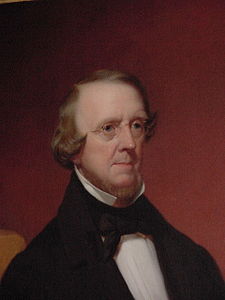 Roger Sherman Baldwin Roger Sherman BaldwinRoger Sherman Baldwin Roger Sherman Baldwin was an American lawyer involved in the Amistad case, who later became the 17th Governor of Connecticut and a United States Senator.-Early life:... |
Whig Whig Party (United States) The Whig Party was a political party of the United States during the era of Jacksonian democracy. Considered integral to the Second Party System and operating from the early 1830s to the mid-1850s, the party was formed in opposition to the policies of President Andrew Jackson and his Democratic... |
November 11, 1847 – March 4, 1851 |
30 30th United States Congress The Thirtieth United States Congress was a meeting of the legislative branch of the United States federal government, consisting of the United States Senate and the United States House of Representatives. It met in Washington, D.C. from March 4, 1847 to March 3, 1849, during the last two years of... (Continued) |
Appointed to continue Huntington's term Elected to finish Huntington's term |
|
| 31 31st United States Congress The Thirty-first United States Congress was a meeting of the legislative branch of the United States federal government, consisting of the United States Senate and the United States House of Representatives. It met in Washington, D.C. from March 4, 1849 to March 3, 1851, during the last 17 months... |
||||||
| Vacant | March 4, 1851 – May 12, 1851 |
32 32nd United States Congress The Thirty-second United States Congress was a meeting of the legislative branch of the United States federal government, consisting of the United States Senate and the United States House of Representatives. It met in Washington, D.C. from March 4, 1851 to March 3, 1853, during the third and... |
12 | |||
| 12 |  Isaac Toucey Isaac TouceyIsaac Toucey Isaac Toucey was an American statesman who served as a U.S. Senator, Secretary of the Navy, Attorney General of the United States and the 18th Governor of Connecticut.... |
Democratic Democratic Party (United States) The Democratic Party is one of two major contemporary political parties in the United States, along with the Republican Party. The party's socially liberal and progressive platform is largely considered center-left in the U.S. political spectrum. The party has the lengthiest record of continuous... |
May 12, 1851 – March 4, 1857 |
32 32nd United States Congress The Thirty-second United States Congress was a meeting of the legislative branch of the United States federal government, consisting of the United States Senate and the United States House of Representatives. It met in Washington, D.C. from March 4, 1851 to March 3, 1853, during the third and... (Continued) |
Elected late in 1851 Retired |
|
| 33 33rd United States Congress The Thirty-third United States Congress was a meeting of the legislative branch of the United States federal government, consisting of the United States Senate and the United States House of Representatives. It met in Washington, D.C. from March 4, 1853 to March 3, 1855, during the first two years... |
||||||
| 34 34th United States Congress The Thirty-fourth United States Congress was a meeting of the legislative branch of the United States federal government, consisting of the United States Senate and the United States House of Representatives. It met in Washington, D.C. from March 4, 1855 to March 4, 1857, during the last two years... |
||||||
| 13 | 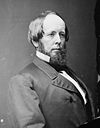 James Dixon James DixonJames Dixon James Dixon was a United States Representative and Senator from Connecticut.-Biography:Born in Enfield, Connecticut, Dixon pursued preparatory studies, and graduated from Williams College in Williamstown, Massachusetts in 1834, where he had been a charter member of The Kappa Alpha Society. He was... |
Republican Republican Party (United States) The Republican Party is one of the two major contemporary political parties in the United States, along with the Democratic Party. Founded by anti-slavery expansion activists in 1854, it is often called the GOP . The party's platform generally reflects American conservatism in the U.S... |
March 4, 1857 – March 4, 1869 |
35 35th United States Congress The 35th United States Congress was a meeting of the legislative branch of the United States federal government, consisting of the United States Senate and the United States House of Representatives. It met in Washington, D.C. from March 4, 1857 to March 3, 1859, during the first two years of James... |
13 | Elected in 1856 United States Senate elections, 1856 The United States Senate election of 1856 was an election which had the young Republican Party assume its position as one of the United States's two main political parties.... |
| 36 36th United States Congress The Thirty-sixth United States Congress was a meeting of the legislative branch of the United States federal government, consisting of the United States Senate and the United States House of Representatives. It met in Washington, D.C. from March 4, 1859 to March 4, 1861, during the third and fourth... |
||||||
| 37 37th United States Congress The Thirty-seventh United States Congress was a meeting of the legislative branch of the United States federal government, consisting of the United States Senate and the United States House of Representatives. It met in Washington, D.C. from March 4, 1861 to March 4, 1863, during the first two... |
||||||
| 38 38th United States Congress -House of Representatives:Before this Congress, the 1860 United States Census and resulting reapportionment changed the size of the House to 241 members... |
14 | Re-elected in 1863 Lost re-election |
||||
| 39 39th United States Congress The Thirty-ninth United States Congress was a meeting of the legislative branch of the United States federal government, consisting of the United States Senate and the United States House of Representatives. It met in Washington, D.C. from March 4, 1865 to March 4, 1867, during the first month of... |
||||||
| 40 40th United States Congress The Fortieth United States Congress was a meeting of the legislative branch of the United States federal government, consisting of the United States Senate and the United States House of Representatives. It met in Washington, D.C. from March 4, 1867 to March 4, 1869, during the third and fourth... |
||||||
| 14 | 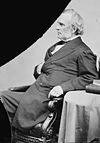 William Alfred Buckingham William Alfred BuckinghamWilliam Alfred Buckingham William Alfred Buckingham was a Republican United States Senator from Connecticut.Born in Lebanon, Connecticut, Buckingham attended the common schools and Bacon Academy in Colchester, Connecticut. He engaged in mercantile pursuits and in manufacturing. He served as the mayor of Norwich,... |
Republican Republican Party (United States) The Republican Party is one of the two major contemporary political parties in the United States, along with the Democratic Party. Founded by anti-slavery expansion activists in 1854, it is often called the GOP . The party's platform generally reflects American conservatism in the U.S... |
March 4, 1869 – February 5, 1875 |
41 41st United States Congress -House of Representatives:- Senate :* President : Schuyler Colfax* President pro tempore: Henry B. Anthony - House of Representatives :* Speaker: James G. Blaine -Members:This list is arranged by chamber, then by state... |
15 | Elected in 1868 United States Senate elections, 1868 The United States Senate election of 1868 was an election which had the Republican Party gain five seats in the United States Senate, enlarging their already overwhelming majority.... Died |
| 42 42nd United States Congress The Forty-second United States Congress was a meeting of the legislative branch of the United States federal government, consisting of the United States Senate and the United States House of Representatives. It met in Washington, D.C. from March 4, 1871 to March 3, 1873, during the third and fourth... |
||||||
| 43 43rd United States Congress The Forty-third United States Congress was a meeting of the legislative branch of the United States federal government, consisting of the United States Senate and the United States House of Representatives. It met in Washington, D.C. from March 4, 1873 to March 4, 1875, during the fifth and sixth... |
||||||
| 15 |  William W. Eaton William W. EatonWilliam W. Eaton William Wallace Eaton was a United States Representative and United States Senator from Connecticut.-Early career:... |
Democratic Democratic Party (United States) The Democratic Party is one of two major contemporary political parties in the United States, along with the Republican Party. The party's socially liberal and progressive platform is largely considered center-left in the U.S. political spectrum. The party has the lengthiest record of continuous... |
February 5, 1875 – March 4, 1881 |
Appointed to finish Buckingham's term, having been elected to the next term |
||
| 44 44th United States Congress The Forty-fourth United States Congress was a meeting of the legislative branch of the United States federal government, consisting of the United States Senate and the United States House of Representatives. It met in Washington, D.C. from March 4, 1875 to March 4, 1877, during the seventh and... |
16 | Elected in 1874 United States Senate elections, 1874 The United States Senate election of 1874 was an election which had the Democratic Party gain nine seats in the United States Senate.As this election was prior to ratification of the seventeenth amendment, Senators were chosen by State legislatures.-Results:... |
||||
| 45 45th United States Congress -House of Representatives:-Leadership:-Senate:*President: William A. Wheeler *President pro tempore: Thomas W. Ferry -House of Representatives:*Speaker: Samuel J. Randall -Members:This list is arranged by chamber, then by state... |
||||||
| 46 46th United States Congress The Forty-sixth United States Congress was a meeting of the legislative branch of the United States federal government, consisting of the United States Senate and the United States House of Representatives. It met in Washington, D.C. from March 4, 1879 to March 4, 1881, during the last two years of... |
||||||
| 16 | 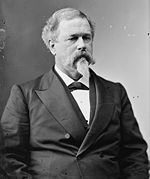 Joseph Roswell Hawley Joseph Roswell HawleyJoseph Roswell Hawley Joseph Roswell Hawley was the 42nd Governor of Connecticut, a U.S. politician in the Republican and Free Soil parties, a Civil War general, and a journalist and newspaper editor. He served two terms in the United States House of Representatives and was a four-term U.S... |
Republican Republican Party (United States) The Republican Party is one of the two major contemporary political parties in the United States, along with the Democratic Party. Founded by anti-slavery expansion activists in 1854, it is often called the GOP . The party's platform generally reflects American conservatism in the U.S... |
March 4, 1881 – March 4, 1905 |
47 47th United States Congress The Forty-seventh United States Congress was a meeting of the legislative branch of the United States federal government, consisting of the United States Senate and the United States House of Representatives. It met in Washington, D.C. from March 4, 1881 to March 4, 1883, during the administration... |
17 | Elected in 1881 |
| 48 48th United States Congress The Forty-eighth United States Congress was a meeting of the legislative branch of the United States federal government, consisting of the United States Senate and the United States House of Representatives. It met in Washington, D.C. from March 4, 1883 to March 4, 1885, during the last two years... |
||||||
| 49 49th United States Congress The Forty-ninth United States Congress was a meeting of the legislative branch of the United States federal government, consisting of the United States Senate and the United States House of Representatives. It met in Washington, D.C. from March 4, 1885 to March 4, 1887, during the first two years... |
||||||
| 50 50th United States Congress The Fiftieth United States Congress was a meeting of the legislative branch of the United States federal government, consisting of the United States Senate and the United States House of Representatives. It met in Washington, D.C. from March 4, 1887 to March 4, 1889, during the third and fourth... |
18 | Re-elected in 1887 | ||||
| 51 51st United States Congress The Fifty-first United States Congress, referred to by some critics as the Billion Dollar Congress, was a meeting of the legislative branch of the United States federal government, consisting of the United States Senate and the United States House of Representatives. It met in Washington, D.C... |
||||||
| 52 52nd United States Congress The Fifty-second United States Congress was a meeting of the legislative branch of the United States federal government, consisting of the United States Senate and the United States House of Representatives. It met in Washington, D.C... |
||||||
| 53 53rd United States Congress The Fifty-third United States Congress was a meeting of the legislative branch of the United States federal government, consisting of the United States Senate and the United States House of Representatives. It met in Washington, D.C. from March 4, 1893 to March 4, 1895, during the fifth and sixth... |
19 | Re-elected in 1893 | ||||
| 54 54th United States Congress - House of Representatives :-Leadership:- Senate :* President: Adlai E. Stevenson * President pro tempore: William P. Frye - Majority leadership :* Republican Conference Chairman: John Sherman- Minority leadership :... |
||||||
| 55 55th United States Congress -House of Representatives:* Republican: 206 * Democratic: 124* Populist: 22* Silver Republican: 3* Silver: 1* Independent Republican: 1TOTAL members: 357-Leadership:-Senate:* President: Garret Hobart * President pro tempore: William P... |
||||||
| 56 56th United States Congress -House of Representatives:- Leadership :- Senate :* President: Garret Hobart , until November 21, 1899 , vacant thereafter.* President pro tempore: William P. Frye * Democratic Caucus Chairman: James K. Jones... |
20 | Re-elected in 1899 Retired |
||||
| 57 57th United States Congress -House of Representatives:*Democratic: 151*Republican: 200 *Populist: 5*Silver : 1TOTAL members: 357-Leadership:-Senate:* President: Theodore Roosevelt , until September 14, 1901, vacant thereafter.... |
||||||
| 58 58th United States Congress - House of Representatives :* Republican : 209 * Democratic : 176* Silver Republican : 1TOTAL members: 386-Senate:* President: Vacant* President pro tempore: William P. Frye -Members:... |
||||||
| 17 | 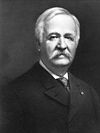 Morgan G. Bulkeley Morgan G. BulkeleyMorgan G. Bulkeley Morgan Gardner Bulkeley was an American politician as well as business and sports executive. Bulkeley, a Republican, served in the American Civil War, was a Hartford city councilman and bank president, was elected to the National Baseball Hall of Fame as the first president of the National... |
Republican Republican Party (United States) The Republican Party is one of the two major contemporary political parties in the United States, along with the Democratic Party. Founded by anti-slavery expansion activists in 1854, it is often called the GOP . The party's platform generally reflects American conservatism in the U.S... |
March 4, 1905 – March 4, 1911 |
59 59th United States Congress The Fifty-ninth United States Congress was a meeting of the legislative branch of the United States federal government, composed of the United States Senate and the United States House of Representatives. It met in Washington, DC from March 4, 1905 to March 4, 1907, during the fifth and sixth... |
21 | Elected in 1904 United States Senate elections, 1904 The United States Senate election of 1904 was an election which coincided with President Theodore Roosevelt's landslide re-election, and which had the Republican Party gain one seat in the United States Senate.... Lost re-election |
| 60 60th United States Congress The Sixtieth United States Congress was a meeting of the legislative branch of the United States federal government, composed of the United States Senate and the United States House of Representatives. It met in Washington, DC from March 4, 1907 to March 4, 1909, during the last two years of... |
||||||
| 61 61st United States Congress The Sixty-first United States Congress was a meeting of the legislative branch of the United States federal government, composed of the United States Senate and the United States House of Representatives. It met in Washington, DC from March 4, 1909 to March 4, 1911, during the first two years of... |
||||||
| 18 | 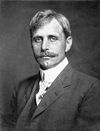 George P. McLean George P. McLeanGeorge P. McLean George Payne McLean was a United States Senator from Connecticut. Born in Simsbury, he attended the common schools and studied law. He was admitted to the bar in 1881 and commenced practice in Hartford. He was a member of the Connecticut House of Representatives in 1883 and 1884, and a member of... |
Republican Republican Party (United States) The Republican Party is one of the two major contemporary political parties in the United States, along with the Democratic Party. Founded by anti-slavery expansion activists in 1854, it is often called the GOP . The party's platform generally reflects American conservatism in the U.S... |
March 4, 1911 – March 4, 1929 |
62 62nd United States Congress - House of Representatives :* Democratic : 230 * Republican : 162* Socialist : 1* Independent : 1TOTAL members: 394-Senate:* President: James S... |
22 | Elected in 1911 |
| 63 63rd United States Congress - House of Representatives:*Democratic : 291 *Republican : 134*Progressive : 9*Independent : 1TOTAL members: 435-Senate:*President of the Senate: Thomas R. Marshall*President pro tempore: James P. Clarke-Senate:... |
||||||
| 64 64th United States Congress The Sixty-fourth United States Congress was a meeting of the legislative branch of the United States federal government, composed of the United States Senate and the United States House of Representatives. It met in Washington, DC from March 4, 1915 to March 4, 1917, during the third and fourth... |
||||||
| 65 65th United States Congress The Sixty-fifth United States Congress was a meeting of the legislative branch of the United States federal government, composed of the United States Senate and the United States House of Representatives. It met in Washington, DC from March 4, 1917 to March 4, 1919, during the fourth and fifth... |
23 | Re-elected in 1916 | ||||
| 66 66th United States Congress The Sixty-sixth United States Congress was a meeting of the legislative branch of the United States federal government, comprising the United States Senate and the United States House of Representatives. It met in Washington, DC from March 4, 1919 to March 4, 1921, during the last two years of... |
||||||
| 67 67th United States Congress The Sixty-seventh United States Congress was a meeting of the legislative branch of the United States federal government, consisting of the United States Senate and the United States House of Representatives. It met in Washington, D.C. from March 4, 1921 to March 4, 1923, during the first two years... |
||||||
| 68 68th United States Congress The Sixty-eighth United States Congress was a meeting of the legislative branch of the United States federal government, consisting of the United States Senate and the United States House of Representatives. It met in Washington, D.C. from March 4, 1923 to March 4, 1925, during the last months of... |
24 | Re-elected in 1922 Retired |
||||
| 69 69th United States Congress The Sixty-ninth United States Congress was a meeting of the legislative branch of the United States federal government, consisting of the United States Senate and the United States House of Representatives. It met in Washington, D.C. from March 4, 1925 to March 4, 1927, during the third and fourth... |
||||||
| 70 70th United States Congress The Seventieth United States Congress was a meeting of the legislative branch of the United States federal government, consisting of the United States Senate and the United States House of Representatives. It met in Washington, D.C. from March 4, 1927 to March 3, 1929, during the last two years of... |
||||||
| 19 |  Frederic C. Walcott Frederic C. WalcottFrederic C. Walcott Frederic Collin Walcott was a United States Senator from Connecticut. Born in New York Mills, Oneida County, New York, he attended the public schools of Utica, New York and graduated from Lawrenceville School in 1886, from Phillips Academy in 1887 and from Yale University in 1891, where he was a... |
Republican Republican Party (United States) The Republican Party is one of the two major contemporary political parties in the United States, along with the Democratic Party. Founded by anti-slavery expansion activists in 1854, it is often called the GOP . The party's platform generally reflects American conservatism in the U.S... |
March 4, 1929 – January 3, 1935 |
71 71st United States Congress The Seventy-first United States Congress was a meeting of the legislative branch of the United States federal government, consisting of the United States Senate and the United States House of Representatives. It met in Washington, D.C. from March 4, 1929 to March 4, 1931, during the first two years... |
25 | Elected in 1928 Lost re-election |
| 72 72nd United States Congress The Seventy-second United States Congress was a meeting of the legislative branch of the United States federal government, consisting of the United States Senate and the United States House of Representatives. It met in Washington, D.C. from March 4, 1931 to March 4, 1933, during the last two years... |
||||||
| 73 73rd United States Congress The Seventy-third United States Congress was a meeting of the legislative branch of the United States federal government, composed of the United States Senate and the United States House of Representatives. It met in Washington, DC from March 4, 1933 to January 3, 1935, during the first two years... |
||||||
| 20 | 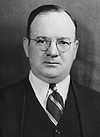 Francis T. Maloney Francis T. MaloneyFrancis T. Maloney Francis Thomas Maloney was a U.S. Representative from Connecticut from 1933 to 1935 and a U.S. Senator from Connecticut from 1935 to 1945. He was a Democrat.-Early life:... |
Democratic Democratic Party (United States) The Democratic Party is one of two major contemporary political parties in the United States, along with the Republican Party. The party's socially liberal and progressive platform is largely considered center-left in the U.S. political spectrum. The party has the lengthiest record of continuous... |
January 3, 1935 – January 16, 1945 |
74 74th United States Congress -House:Also 2 Delegates, 3 Resident Commissioners-Senate:*President of the Senate: John N. Garner *President pro tempore: Key Pittman -Majority leadership:*Majority leader: Joseph T. Robinson... |
26 | Elected in 1934 |
| 75 75th United States Congress The Seventy-fifth United States Congress was a meeting of the legislative branch of the United States federal government, composed of the United States Senate and the United States House of Representatives. It met in Washington, DC from January 3, 1937 to January 3, 1939, during the first two years... |
||||||
| 76 76th United States Congress The Seventy-sixth United States Congress was a meeting of the legislative branch of the United States federal government, composed of the United States Senate and the United States House of Representatives. It met in Washington, DC from January 3, 1939 to January 3, 1941, during the seventh and... |
||||||
| 77 77th United States Congress -Major events:* December 7, 1941: Attack on Pearl Harbor* December 8, 1941: Joint Session of Congress met to hear President Roosevelt deliver his "Day of Infamy" speech... |
27 | Re-elected in 1940 Died |
||||
| 78 78th United States Congress The Seventy-eighth United States Congress was a meeting of the legislative branch of the United States federal government, composed of the United States Senate and the United States House of Representatives. It met in Washington, DC from January 3, 1943 to January 3, 1945, during the last two years... |
||||||
| 79 79th United States Congress The Seventy-ninth United States Congress was a meeting of the legislative branch of the United States federal government, composed of the United States Senate and the United States House of Representatives. It met in Washington, DC from January 3, 1945 to January 3, 1947, during the last months of... |
||||||
| Vacant | January 16, 1945 – February 15, 1945 |
|||||
| 21 | 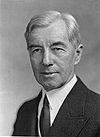 Thomas C. Hart Thomas C. HartThomas C. Hart Thomas Charles Hart was an admiral of the United States Navy, whose service extended from the Spanish-American War through World War II. Following his retirement from the Navy, he served briefly as a United States Senator from Connecticut.-Life and career:Hart was born in Genesee County, Michigan... |
Republican Republican Party (United States) The Republican Party is one of the two major contemporary political parties in the United States, along with the Democratic Party. Founded by anti-slavery expansion activists in 1854, it is often called the GOP . The party's platform generally reflects American conservatism in the U.S... |
February 15, 1945 – November 5, 1946 |
Appointed to continue Maloney's term Successor qualified |
||
| Vacant | November 5, 1946 – December 27, 1946 |
|||||
| 22 |  Raymond E. Baldwin Raymond E. BaldwinRaymond E. Baldwin Raymond Earl Baldwin was a United States Senator, the 72nd and 74th Governor of Connecticut.-Biography:Born in Rye, New York, he moved to Middletown, Connecticut in 1903 and attended the public schools. He graduated from Wesleyan University in Middletown in 1916, and entered Yale University... |
Republican Republican Party (United States) The Republican Party is one of the two major contemporary political parties in the United States, along with the Democratic Party. Founded by anti-slavery expansion activists in 1854, it is often called the GOP . The party's platform generally reflects American conservatism in the U.S... |
December 27, 1946 – December 16, 1949 |
79 79th United States Congress The Seventy-ninth United States Congress was a meeting of the legislative branch of the United States federal government, composed of the United States Senate and the United States House of Representatives. It met in Washington, DC from January 3, 1945 to January 3, 1947, during the last months of... (Continued) |
Elected to finish Maloney's term, having been elected to the next term |
|
| 80 80th United States Congress The Eightieth United States Congress was a meeting of the legislative branch of the United States federal government, composed of the United States Senate and the United States House of Representatives. It met in Washington, DC from January 3, 1947 to January 3, 1949, during the third and fourth... |
28 | Elected in 1946 Resigned |
||||
| 81 81st United States Congress The Eighty-first United States Congress was a meeting of the legislative branch of the United States federal government, composed of the United States Senate and the United States House of Representatives... |
||||||
| 23 | William Benton | Democratic Democratic Party (United States) The Democratic Party is one of two major contemporary political parties in the United States, along with the Republican Party. The party's socially liberal and progressive platform is largely considered center-left in the U.S. political spectrum. The party has the lengthiest record of continuous... |
December 17, 1949 – January 3, 1953 |
Appointed to continue Baldwin's term Elected to finish Baldwin's term Lost election to next term |
||
| 82 82nd United States Congress The Eighty-second United States Congress was a meeting of the legislative branch of the United States federal government, composed of the United States Senate and the United States House of Representatives. It met in Washington, DC from January 3, 1951 to January 3, 1953, during the last two years... |
||||||
| 24 | 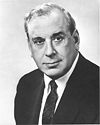 William A. Purtell William A. PurtellWilliam A. Purtell William Arthur Purtell was an American politician from Connecticut. He was a veteran of the First World War and an unsuccessful candidate for the Republican nomination for governor in 1950... |
Republican Republican Party (United States) The Republican Party is one of the two major contemporary political parties in the United States, along with the Democratic Party. Founded by anti-slavery expansion activists in 1854, it is often called the GOP . The party's platform generally reflects American conservatism in the U.S... |
January 3, 1953 – January 3, 1959 |
83 83rd United States Congress The Eighty-third United States Congress was a meeting of the legislative branch of the United States federal government, composed of the United States Senate and the United States House of Representatives. It met in Washington, DC from January 3, 1953 to January 3, 1955, during the first two years... |
29 | Elected in 1952 Lost re-election |
| 84 84th United States Congress The Eighty-fourth United States Congress was a meeting of the legislative branch of the United States federal government, composed of the United States Senate and the United States House of Representatives. It met in Washington, DC from January 3, 1955 to January 3, 1957, during the third and... |
||||||
| 85 85th United States Congress The Eighty-fifth United States Congress was a meeting of the legislative branch of the United States federal government, composed of the United States Senate and the United States House of Representatives. It met in Washington, DC from January 3, 1957 to January 3, 1959, during the fifth and sixth... |
||||||
| 25 |  Thomas J. Dodd Thomas J. DoddThomas J. Dodd Thomas Joseph Dodd was a United States Senator and Representative from Connecticut, He was the first Senator censured by the US Senate since Joseph McCarthy in 1954, and was one of only six people censured by the Senate in the 20th century. He is the father of former U.S. Senator Christopher Dodd... |
Democratic Democratic Party (United States) The Democratic Party is one of two major contemporary political parties in the United States, along with the Republican Party. The party's socially liberal and progressive platform is largely considered center-left in the U.S. political spectrum. The party has the lengthiest record of continuous... |
January 3, 1959 – January 3, 1971 |
86 86th United States Congress The Eighty-sixth United States Congress was a meeting of the legislative branch of the United States federal government, composed of the United States Senate and the United States House of Representatives. It met in Washington, DC from January 3, 1959 to January 3, 1961, during the last two years... |
30 | Elected in 1958 |
| 87 87th United States Congress -House of Representatives :-Senate:* President: Richard Nixon , until January 20, 1961** Lyndon Johnson , from January 20, 1961* President pro tempore: Carl Hayden -House of Representatives:... |
||||||
| 88 88th United States Congress The Eighty-eighth United States Congress was a meeting of the legislative branch of the United States federal government, composed of the United States Senate and the United States House of Representatives. It met in Washington, DC from January 3, 1963 to January 3, 1965, during the last year of... |
||||||
| 89 89th United States Congress -House of Representatives:- Senate :* President of the Senate: Hubert Humphrey , starting January 20, 1965* President pro tempore: Carl Hayden - Majority leadership :* Majority Leader and Democratic Conference Chairman: Mike Mansfield... |
31 | Re-elected in 1964 Lost re-election |
||||
| 90 90th United States Congress The Ninetieth United States Congress was a meeting of the legislative branch of the United States federal government, composed of the United States Senate and the United States House of Representatives. It met in Washington, DC from January 3, 1967 to January 3, 1969, during the last two years of... |
||||||
| 91 91st United States Congress The Ninety-first United States Congress was a meeting of the legislative branch of the United States federal government, composed of the United States Senate and the United States House of Representatives. It met in Washington, DC from January 3, 1969 to January 3, 1971, during the first two years... |
||||||
| 26 |  Lowell P. Weicker, Jr. Lowell P. Weicker, Jr.Lowell P. Weicker, Jr. Lowell Palmer Weicker, Jr. is an American politician who served as a U.S. Representative, U.S. Senator, and the 85th Governor of Connecticut, and unsuccessfully sought the Republican nomination for President in 1980... |
Republican Republican Party (United States) The Republican Party is one of the two major contemporary political parties in the United States, along with the Democratic Party. Founded by anti-slavery expansion activists in 1854, it is often called the GOP . The party's platform generally reflects American conservatism in the U.S... |
January 3, 1971 – January 3, 1989 |
92 92nd United States Congress The Ninety-second United States Congress was a meeting of the legislative branch of the United States federal government, composed of the United States Senate and the United States House of Representatives... |
32 | Elected in 1970 |
| 93 93rd United States Congress The Ninety-third United States Congress was a meeting of the legislative branch of the United States federal government, composed of the United States Senate and the United States House of Representatives. It met in Washington, DC from January 3, 1973 to January 3, 1975, during the end of Richard... |
||||||
| 94 94th United States Congress The Ninety-fourth United States Congress was a meeting of the legislative branch of the United States federal government, composed of the United States Senate and the United States House of Representatives. It met in Washington, DC from January 3, 1975 to January 3, 1977, during the administration... |
||||||
| 95 95th United States Congress The Ninety-fifth United States Congress was a meeting of the legislative branch of the United States federal government, composed of the United States Senate and the United States House of Representatives. It met in Washington, DC from January 3, 1977 to January 3, 1979, during the first two years... |
33 | Re-elected in 1976 | ||||
| 96 96th United States Congress The Ninety-sixth United States Congress was a meeting of the legislative branch of the United States federal government, composed of the United States Senate and the United States House of Representatives. It met in Washington, DC from January 3, 1979 to January 3, 1981, during the last two years... |
||||||
| 97 97th United States Congress The Ninety-seventh United States Congress was a meeting of the legislative branch of the United States federal government, composed of the United States Senate and the United States House of Representatives. It met in Washington, DC from January 3, 1981 to January 3, 1983, during the final weeks of... |
||||||
| 98 98th United States Congress The Ninety-eighth United States Congress was a meeting of the legislative branch of the United States federal government, composed of the United States Senate and the United States House of Representatives. It met in Washington, DC from January 3, 1983 to January 3, 1985, during the third and... |
34 | Re-elected in 1982 United States Senate elections, 1982 The United States Senate election of November 2, 1982 was an election for the United States Senate following the Republican gains in 1980. Party balance was unchanged following the election. Incumbents Howard Cannon of Nevada and Harrison Schmitt of New Mexico lost seats to the opposite party, the... Lost re-election |
||||
| 99 99th United States Congress The Ninety-ninth United States Congress was a meeting of the legislative branch of the United States federal government, composed of the United States Senate and the United States House of Representatives. It met in Washington, DC from January 3, 1985 to January 3, 1987, during the fifth and sixth... |
||||||
| 100 100th United States Congress -House of Representatives:- Senate :* President: George H.W. Bush * President pro tempore: John Stennis - Majority leadership :* Majority Leader, Democratic Conference Chairman, and Democratic Policy Committee Chairman: Robert Byrd... |
||||||
| 27 |  Joseph Lieberman Joseph Lieberman |
Democratic Democratic Party (United States) The Democratic Party is one of two major contemporary political parties in the United States, along with the Republican Party. The party's socially liberal and progressive platform is largely considered center-left in the U.S. political spectrum. The party has the lengthiest record of continuous... |
January 3, 1989 – Present |
101 101st United States Congress The One Hundred First United States Congress was a meeting of the legislative branch of the United States federal government, composed of the United States Senate and the United States House of Representatives. It met in Washington, DC from January 3, 1989 to January 3, 1991, during the first two... |
35 | Elected in 1988 United States Senate election in Connecticut, 1988 The 1988 United States Senate election in Connecticut took place on November 8, 1988. Incumbent Republican U.S. Senator Lowell P. Weicker, Jr. ran for re-election to a fourth term, but was defeated by Democrat Joe Lieberman.-Results:... |
| 102 102nd United States Congress -House of Representatives:- Senate :* President:Dan Quayle * President pro tempore: Robert Byrd - Majority leadership :* Majority Leader: George Mitchell* Majority Whip: Wendell Ford- Minority leadership :... |
||||||
| 103 103rd United States Congress - House of Representatives :- Leadership :- Senate :* President: Dan Quayle , until January 20, 1993** Al Gore , from January 20, 1993* President pro tempore: Robert Byrd - Majority leadership :* Majority Leader: George Mitchell... |
||||||
| 104 104th United States Congress The One Hundred Fourth United States Congress was a meeting of the legislative branch of the United States federal government, composed of the United States Senate and the United States House of Representatives. It met in Washington, DC from January 3, 1995 to January 3, 1997, during the third and... |
36 | Re-elected in 1994 United States Senate election in Connecticut, 1994 The 1994 United States Senate election in Connecticut took place on November 8, 1994. Incumbent Democratic U.S. Senator Joe Lieberman won re-election to a second term.-Results:... |
||||
| 105 105th United States Congress The One Hundred Fifth United States Congress was a meeting of the legislative branch of the United States federal government, composed of the United States Senate and the United States House of Representatives. It met in Washington, DC from January 3, 1997 to January 3, 1999, during the fifth and... |
||||||
| 106 106th United States Congress The One Hundred Sixth United States Congress was a meeting of the legislative branch of the United States federal government, composed of the United States Senate and the United States House of Representatives. It met in Washington, DC from January 3, 1999 to January 3, 2001, during the last two... |
||||||
| 107 107th United States Congress The One Hundred Seventh United States Congress was a meeting of the legislative branch of the United States federal government, composed of the United States Senate and the United States House of Representatives. It met in Washington, D.C. from January 3, 2001 to January 3, 2003, during the final... |
37 | Re-elected in 2000 United States Senate election in Connecticut, 2000 The 2000 United States Senate election in Connecticut took place on November 7, 2000 in conjunction with the 2000 U.S. presidential election, other elections to the United States Senate in other states, as well as elections to the United States House of Representatives and various state and local... |
||||
| 108 108th United States Congress The One Hundred Eighth United States Congress was the legislative branch of the United States federal government, composed of the United States Senate and the United States House of Representatives from January 3, 2003 to January 3, 2005, during the third and fourth years of George W. Bush's... |
||||||
| 109 109th United States Congress The One Hundred Ninth United States Congress was the legislative branch of the United States, composed of the United States Senate and the United States House of Representatives, from January 3, 2005 to January 3, 2007, during the fifth and sixth years of George W. Bush's presidency. House members... |
||||||
| Independent Democrat Independent Democrat Independent Democrat is a term occasionally adopted by American politicians to refer to their party affiliation. Several elected officials, including members of Congress, have identified as " Independent Democrats."... ic |
110 110th United States Congress The One Hundred Tenth United States Congress was the meeting of the legislative branch of the United States federal government, between January 3, 2007, and January 3, 2009, during the last two years of the second term of President George W. Bush. It was composed of the Senate and the House of... |
38 | Lost re-nomination, but re-elected in 2006 United States Senate election in Connecticut, 2006 The 2006 United States Senate election in Connecticut was held on November 7, 2006. Incumbent Democratic U.S. Senator Joe Lieberman lost the August 8th Democratic primary to Ned Lamont. Lieberman formed his own third party and won in the general election to a fourth term.-Democratic primary:The... |
|||
| 111 111th United States Congress The One Hundred Eleventh United States Congress was the meeting of the legislative branch of the United States federal government from January 3, 2009 until January 3, 2011. It began during the last two weeks of the George W. Bush administration, with the remainder spanning the first two years of... |
||||||
| 112 112th United States Congress The One Hundred Twelfth United States Congress is the current meeting of the legislative branch of the United States federal government, composed of the United States Senate and the United States House of Representatives. It convened in Washington, D.C. on January 3, 2011, and will end on January... |
||||||
| # | Senator | Party | Years | Congress | Term | Electoral history |
Class 3
Class 3 SenatorsClasses of United States Senators
The three classes of United States Senators are currently made up of 33 or 34 Senate seats. The purpose of the classes is to determine which Senate seats will be up for election in a given year. The three groups are staggered so that one of them is up for election every two years.A senator's...
belong to the electoral cycle that were elected to the first three U.S. Congresses in the first election of 1788 and whose seats in recent years are contested in 1998
United States Senate election in Connecticut, 1998
The 1998 United States Senate election in Connecticut took place on November 3, 1998 alongside other elections to the United States Senate in other states as well as elections to the United States House of Representatives and various state and local elections. Incumbent Democrat U.S. Senator Chris...
, 2004
United States Senate election in Connecticut, 2004
The 2004 United States Senate election in Connecticut took place on November 2, 2004 alongside other elections to the United States Senate in other states as well as elections to the United States House of Representatives and various state and local elections. Incumbent Democrat U.S...
, 2010
United States Senate election in Connecticut, 2010
The 2010 United States Senate election in Connecticut was a midterm election which took place on November 2, 2010 to decide a Class III Senator from the State of Connecticut to join the 112th United States Congress. Incumbent Democratic U.S...
, and 2016.
| # | Senator | Party | Years | Congress | Term | Electoral history |
|---|---|---|---|---|---|---|
| 1 |  William Samuel Johnson William Samuel JohnsonWilliam Samuel Johnson William Samuel Johnson was an early American statesman who was notable for signing the United States Constitution, for representing Connecticut in the United States Senate, and for serving as president of Columbia University.-Early career:... |
Pro- Administration Pro-Administration Party (United States) Pro-Administration "Party" is a term by historians to describe the supporters of the policies of George Washington's administration — especially Treasury Secretary Alexander Hamilton's financial policies — prior to the formation of the Federalist and Democratic-Republican Parties.Almost the entire... |
March 4, 1789 – March 4, 1791 |
1 1st United States Congress -House of Representatives:During this congress, five House seats were added for North Carolina and one House seat was added for Rhode Island when they ratified the Constitution.-Senate:* President: John Adams * President pro tempore: John Langdon... |
1 | Elected in 1788/1789 Resigned |
| Vacant | March 4, 1791 – June 13, 1791 |
2 2nd United States Congress -House of Representatives:During this congress, two new House seats were added for each of the new states of Vermont and Kentucky. -Leadership:-Senate:*President: John Adams *President pro tempore:** Richard Henry Lee... |
||||
| 2 | 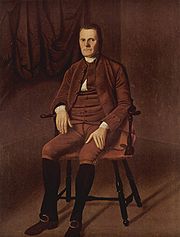 Roger Sherman Roger ShermanRoger Sherman Roger Sherman was an early American lawyer and politician, as well as a founding father. He served as the first mayor of New Haven, Connecticut, and served on the Committee of Five that drafted the Declaration of Independence, and was also a representative and senator in the new republic... |
Pro- Administration Pro-Administration Party (United States) Pro-Administration "Party" is a term by historians to describe the supporters of the policies of George Washington's administration — especially Treasury Secretary Alexander Hamilton's financial policies — prior to the formation of the Federalist and Democratic-Republican Parties.Almost the entire... |
June 13, 1791 – July 23, 1793 |
2 2nd United States Congress -House of Representatives:During this congress, two new House seats were added for each of the new states of Vermont and Kentucky. -Leadership:-Senate:*President: John Adams *President pro tempore:** Richard Henry Lee... (Continued) |
Elected to finish Johnson's term Died |
|
| 3 3rd United States Congress The Third United States Congress was a meeting of the legislative branch of the United States federal government, consisting of the United States Senate and the United States House of Representatives... |
||||||
| Vacant | July 23, 1793 – December 2, 1793 |
|||||
| 3 | 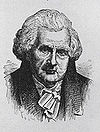 Stephen Mix Mitchell Stephen Mix MitchellStephen Mix Mitchell Stephen Mix Mitchell was an American lawyer, jurist, and statesman from Wethersfield, Connecticut. He represented Connecticut in the Continental Congress and the U.S. Senate and was chief justice of the state's Supreme Court.When Roger Sherman died in 1793, Governor Huntington appointed him to the... |
Pro- Administration Pro-Administration Party (United States) Pro-Administration "Party" is a term by historians to describe the supporters of the policies of George Washington's administration — especially Treasury Secretary Alexander Hamilton's financial policies — prior to the formation of the Federalist and Democratic-Republican Parties.Almost the entire... |
December 2, 1793 – March 4, 1795 |
3 3rd United States Congress The Third United States Congress was a meeting of the legislative branch of the United States federal government, consisting of the United States Senate and the United States House of Representatives... (Continued) |
Appointed to finish Sherman's term Retired |
|
| 4 | 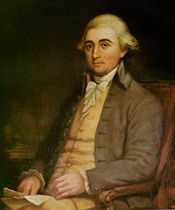 Jonathan Trumbull, Jr. Jonathan Trumbull, Jr.Jonathan Trumbull, Jr. Jonathan Trumbull, Jr. was an American politician who served as the second Speaker of the United States House of Representatives.... |
Federalist Federalist Party (United States) The Federalist Party was the first American political party, from the early 1790s to 1816, the era of the First Party System, with remnants lasting into the 1820s. The Federalists controlled the federal government until 1801... |
March 4, 1795 – June 10, 1796 |
4 4th United States Congress -House of Representatives:- Senate :* President: John Adams * President pro tempore:** Henry Tazewell , first elected December 7, 1795** Samuel Livermore , first elected May 6, 1796** William Bingham , first elected February 16, 1797... |
2 | Elected in 1794 United States Senate elections, 1794 The United States Senate elections of 1794 was the election which had the formation of organized political parties in the United States, with the Federalist Party emerging from the Pro Administration coalition, and the Democratic-Republican Party emerging from the Anti-Administration coalition.As... Resigned to become Lieutenant Governor of Connecticut |
| Vacant | June 10, 1796 – October 13, 1796 |
|||||
| 5 |  Uriah Tracy Uriah TracyUriah Tracy Uriah Tracy was an American politician from Connecticut who served in both the House of Representatives and the Senate.... |
Federalist Federalist Party (United States) The Federalist Party was the first American political party, from the early 1790s to 1816, the era of the First Party System, with remnants lasting into the 1820s. The Federalists controlled the federal government until 1801... |
October 13, 1796 – July 19, 1807 |
4 4th United States Congress -House of Representatives:- Senate :* President: John Adams * President pro tempore:** Henry Tazewell , first elected December 7, 1795** Samuel Livermore , first elected May 6, 1796** William Bingham , first elected February 16, 1797... (Continued) |
Elected to finish Trumbull's term | |
| 5 5th United States Congress The Fifth United States Congress was a meeting of the legislative branch of the United States federal government, consisting of the United States Senate and the United States House of Representatives... |
||||||
| 6 6th United States Congress The Sixth United States Congress was a meeting of the legislative branch of the United States federal government, consisting of the United States Senate and the United States House of Representatives. It met at Congress Hall in Philadelphia, Pennsylvania and in Washington, D.C. from March 4, 1799... |
||||||
| 7 7th United States Congress - House of Representatives :-Senate:* President: Aaron Burr * President pro tempore:** Abraham Baldwin , first elected December 7, 1801** Stephen R. Bradley , first elected December 14, 1802-House of Representatives:... |
3 | Re-elected in 1801 | ||||
| 8 8th United States Congress - Senate :* President: Aaron Burr * President pro tempore: John Brown , October 17, 1803 – February 26, 1804** Jesse Franklin , March 10, 1804 – November 4, 1804** Joseph Anderson , January 15, 1805 – December 1, 1805- House of Representatives :... |
||||||
| 9 9th United States Congress - Senate :* President: George Clinton * President pro tempore: Samuel Smith - House of Representatives :* Speaker: Nathaniel Macon -Members:This list is arranged by chamber, then by state... |
||||||
| 10 10th United States Congress - House of Representatives :- Senate :*President: George Clinton *President pro tempore: Samuel Smith , elected April 16, 1808** Stephen R. Bradley , elected December 28, 1808** John Milledge , elected January 30, 1809... |
4 | Re-elected in 1807 Died |
||||
| Vacant | July 19, 1807 – October 25, 1807 |
|||||
| 6 | 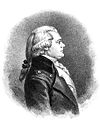 Chauncey Goodrich Chauncey GoodrichChauncey Goodrich Chauncey Goodrich was an American lawyer and politician from Connecticut who represented that state in the United States Congress as both a senator and a representative.-Biography:... |
Federalist Federalist Party (United States) The Federalist Party was the first American political party, from the early 1790s to 1816, the era of the First Party System, with remnants lasting into the 1820s. The Federalists controlled the federal government until 1801... |
October 25, 1807 – May 13, 1813 |
10 10th United States Congress - House of Representatives :- Senate :*President: George Clinton *President pro tempore: Samuel Smith , elected April 16, 1808** Stephen R. Bradley , elected December 28, 1808** John Milledge , elected January 30, 1809... (Continued) |
Elected to finish Tracy's term | |
| 11 11th United States Congress - House of Representatives :-Leadership:- Senate :* President: George Clinton * President pro tempore:** John Milledge ** Andrew Gregg , elected June 26, 1809** John Gaillard , elected February 28, 1810... |
||||||
| 12 12th United States Congress - House of Representatives :During this congress, one new House seat was added for the new state of Louisiana.- Senate :*President: George Clinton *President pro tempore: William H. Crawford -House of Representatives:*Speaker: Henry Clay... |
||||||
| 13 13th United States Congress - Senate :* President: Elbridge Gerry , until November 23, 1814, thereafter vacant.* President pro tempore: Joseph B. Varnum , December 6, 1813 – February 3, 1814** John Gaillard , elected November 25, 1814- House of Representatives :... |
5 | Re-elected in 1813 Resigned to become Lieutenant Governor of Connecticut |
||||
| 7 |  David Daggett David DaggettDavid Daggett David Daggett was a U.S. senator, mayor of New Haven, Connecticut, Judge of the Connecticut Supreme Court of Errors, and a founder of the Yale Law School.-Life:... |
Federalist Federalist Party (United States) The Federalist Party was the first American political party, from the early 1790s to 1816, the era of the First Party System, with remnants lasting into the 1820s. The Federalists controlled the federal government until 1801... |
May 13, 1813 – March 4, 1819 |
Elected to finish Goodrich's term Retired |
||
| 14 14th United States Congress - Senate :* President: Vacant* President pro tempore: John Gaillard of South Carolina, first elected December 4, 1815- House of Representatives :* Speaker: Henry Clay of Kentucky-Members:This list is arranged by chamber, then by state... |
||||||
| 15 15th United States Congress -Leadership:- Senate :* President: Daniel D. Tompkins * President pro tempore:** John Gaillard , elected March 4, 1817** James Barbour , elected February 15, 1819- House of Representatives :*Speaker: Henry Clay -Members:... |
||||||
| 8 | James Lanman James Lanman James Lanman was an American lawyer and politician from Connecticut who served in the United States Senate.-Early life and education:... |
Democratic- Republican Democratic-Republican Party (United States) The Democratic-Republican Party or Republican Party was an American political party founded in the early 1790s by Thomas Jefferson and James Madison. Political scientists use the former name, while historians prefer the latter one; contemporaries generally called the party the "Republicans", along... |
March 4, 1819 – March 4, 1825 |
16 16th United States Congress -House of Representatives:During this congress, one House seat was added for the new state of Alabama and one seat was reapportioned from Massachusetts to the new state of Maine. For the beginning of the next congress, six more seats from Massachusetts would be reapportioned to... |
6 | Elected in 1819 Presented credentials but was not permitted to qualify |
| 17 17th United States Congress The Seventeenth United States Congress was a meeting of the legislative branch of the United States federal government, consisting of the United States Senate and the United States House of Representatives. It met in Washington, D.C. from March 4, 1821 to March 3, 1823, during the fifth and sixth... |
||||||
| Crawford Republican Democratic-Republican Party (United States) The Democratic-Republican Party or Republican Party was an American political party founded in the early 1790s by Thomas Jefferson and James Madison. Political scientists use the former name, while historians prefer the latter one; contemporaries generally called the party the "Republicans", along... |
18 18th United States Congress The Eighteenth United States Congress was a meeting of the legislative branch of the United States federal government, consisting of the United States Senate and the United States House of Representatives. It met in Washington, D.C. from March 4, 1823 to March 3, 1825, during the seventh and eighth... |
|||||
| Vacant | March 4, 1825 – May 4, 1825 |
19 19th United States Congress -House of Representatives:-Leadership:- Senate :* President: John C. Calhoun * President pro tempore: John Gaillard , until December 4, 1825** Nathaniel Macon , from May 20, 1826- House of Representatives :* Speaker: John W. Taylor -Members:... |
7 | |||
| 9 |  Calvin Willey Calvin WilleyCalvin Willey Calvin Willey was an American politician from Connecticut who served in the United States Senate.-Early life:... |
Anti- Jacksonian |
May 4, 1825 – March 4, 1831 |
19 19th United States Congress -House of Representatives:-Leadership:- Senate :* President: John C. Calhoun * President pro tempore: John Gaillard , until December 4, 1825** Nathaniel Macon , from May 20, 1826- House of Representatives :* Speaker: John W. Taylor -Members:... (Continued) |
Elected late to complete Lanman's term | |
| Adams | 20 20th United States Congress -House of Representatives:-Leadership:- Senate :* President: John C. Calhoun * President pro tempore: Samuel Smith - House of Representatives :* Speaker: Andrew Stevenson -Members:This list is arranged by chamber, then by state... |
|||||
| Anti- Jacksonian |
21 21st United States Congress -House of Representatives:-Leadership:- Senate :* President: John C. Calhoun * President pro tempore: Samuel Smith - House of Representatives :* Speaker: Andrew Stevenson -Members:This list is arranged by chamber, then by state... |
|||||
| 10 | Gideon Tomlinson Gideon Tomlinson Gideon Tomlinson was a United States Senator, United States Representative, and the 25th Governor for the state of Connecticut.... |
Anti- Jacksonian |
March 4, 1831 – March 4, 1837 |
22 22nd United States Congress -House of Representatives:-Leadership:- Senate :* President:** John C. Calhoun , resigned December 28, 1832, thereafter vacant.* President pro tempore:** Samuel Smith , first elected December 5, 1831** Littleton W... |
8 | Elected in 1831 |
| 23 23rd United States Congress -House of Representatives:For the beginning of this congress, the size of the House was increased from 213 seats to 240 seats, following the 1830 United States Census .- Leadership :- Senate :* President: Martin Van Buren... |
||||||
| 24 24th United States Congress -House of Representatives:During this congress one House seat was added for each of the new states of Arkansas and Michigan.-Leadership:- Senate :* President: Martin Van Buren * President pro tempore: William R. King - House of Representatives :... |
||||||
| 11 | Perry Smith | Democratic Democratic Party (United States) The Democratic Party is one of two major contemporary political parties in the United States, along with the Republican Party. The party's socially liberal and progressive platform is largely considered center-left in the U.S. political spectrum. The party has the lengthiest record of continuous... |
March 4, 1837 – March 4, 1843 |
25 25th United States Congress -House of Representatives:-Leadership:- Senate :* President: Richard Mentor Johnson * President pro tempore: William R. King - House of Representatives :* Speaker: James K. Polk -Members:This list is arranged by chamber, then by state... |
9 | Elected in 1837 |
| 26 26th United States Congress -House of Representatives:- Leadership :- Senate :*President: Richard M. Johnson *President pro tempore: William R. King - House of Representatives :*Speaker: Robert M.T. Hunter -Members:This list is arranged by chamber, then by state... |
||||||
| 27 27th United States Congress The Twenty-seventh United States Congress was a meeting of the legislative branch of the United States federal government, consisting of the United States Senate and the United States House of Representatives. It met in Washington, D.C. from March 4, 1841 to March 3, 1843, during the one-month... |
||||||
| 12 |  John Milton Niles John Milton NilesJohn Milton Niles John Milton Niles was a lawyer, editor, author and politician from Connecticut, serving in the United States Senate and as United States Postmaster General 1840 to 1841.... |
Democratic Democratic Party (United States) The Democratic Party is one of two major contemporary political parties in the United States, along with the Republican Party. The party's socially liberal and progressive platform is largely considered center-left in the U.S. political spectrum. The party has the lengthiest record of continuous... |
March 4, 1843 – March 4, 1849 |
28 28th United States Congress -House of Representatives:Following the 1840 United States Census, Congress reapportioned the House to include 223 seats . During this congress, one House seat was added for the new state of Florida .- Senate :*President: Vacant... |
10 | Elected in 1843 |
| 29 29th United States Congress -House of Representatives:During this congress, two House seats were added for each of the new states of Texas and Iowa.-Leadership:-Senate:* President: George M. Dallas * President pro tempore: Willie P. Mangum... |
||||||
| 30 30th United States Congress The Thirtieth United States Congress was a meeting of the legislative branch of the United States federal government, consisting of the United States Senate and the United States House of Representatives. It met in Washington, D.C. from March 4, 1847 to March 3, 1849, during the last two years of... |
||||||
| 13 | 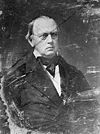 Truman Smith Truman SmithTruman Smith Truman Smith was a politician, lawyer and judge from Connecticut. He was the nephew of Nathaniel Smith and Nathan Smith.... |
Whig Whig Party (United States) The Whig Party was a political party of the United States during the era of Jacksonian democracy. Considered integral to the Second Party System and operating from the early 1830s to the mid-1850s, the party was formed in opposition to the policies of President Andrew Jackson and his Democratic... |
March 4, 1849 – May 24, 1854 |
31 31st United States Congress The Thirty-first United States Congress was a meeting of the legislative branch of the United States federal government, consisting of the United States Senate and the United States House of Representatives. It met in Washington, D.C. from March 4, 1849 to March 3, 1851, during the last 17 months... |
11 | Elected in 1848 United States Senate elections, 1848 The United States Senate election of 1848 was an election which had the Whig Party gain four seats in the United States Senate.As this election was prior to ratification of the seventeenth amendment, Senators were chosen by State legislatures.... Resigned |
| 32 32nd United States Congress The Thirty-second United States Congress was a meeting of the legislative branch of the United States federal government, consisting of the United States Senate and the United States House of Representatives. It met in Washington, D.C. from March 4, 1851 to March 3, 1853, during the third and... |
||||||
| 33 33rd United States Congress The Thirty-third United States Congress was a meeting of the legislative branch of the United States federal government, consisting of the United States Senate and the United States House of Representatives. It met in Washington, D.C. from March 4, 1853 to March 3, 1855, during the first two years... |
||||||
| 14 | 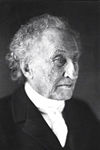 Francis Gillette Francis GilletteFrancis Gillette Francis Gillette was a politician from Connecticut, USA. He was the father of playwright William Gillette and politician and editor Edward H. Gillette.... |
Free Soil | May 24, 1854 – March 4, 1855 |
Elected to finish Smith's term Retired |
||
| 15 | 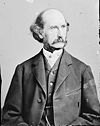 Lafayette S. Foster Lafayette S. FosterLafayette S. Foster Lafayette Sabine Foster was a nineteenth-century American politician and lawyer from Connecticut... |
Republican Republican Party (United States) The Republican Party is one of the two major contemporary political parties in the United States, along with the Democratic Party. Founded by anti-slavery expansion activists in 1854, it is often called the GOP . The party's platform generally reflects American conservatism in the U.S... |
March 4, 1855 – March 4, 1867 |
34 34th United States Congress The Thirty-fourth United States Congress was a meeting of the legislative branch of the United States federal government, consisting of the United States Senate and the United States House of Representatives. It met in Washington, D.C. from March 4, 1855 to March 4, 1857, during the last two years... |
12 | Elected in 1854 United States Senate elections, 1854 The United States Senate election of 1854 was an election which, after the dissolution of the Whig Party, had a coalition of former Whigs known as the Opposition Party.... |
| 35 35th United States Congress The 35th United States Congress was a meeting of the legislative branch of the United States federal government, consisting of the United States Senate and the United States House of Representatives. It met in Washington, D.C. from March 4, 1857 to March 3, 1859, during the first two years of James... |
||||||
| 36 36th United States Congress The Thirty-sixth United States Congress was a meeting of the legislative branch of the United States federal government, consisting of the United States Senate and the United States House of Representatives. It met in Washington, D.C. from March 4, 1859 to March 4, 1861, during the third and fourth... |
||||||
| 37 37th United States Congress The Thirty-seventh United States Congress was a meeting of the legislative branch of the United States federal government, consisting of the United States Senate and the United States House of Representatives. It met in Washington, D.C. from March 4, 1861 to March 4, 1863, during the first two... |
13 | Re-elected in 1860 United States Senate elections, 1860 The United States Senate election of 1860 was an election corresponding with Abraham Lincoln's election to the presidency, with the Republican Party gaining control of the United States Senate. As many Southern States seceded following the election, and members left the Senate to join the... Lost re-election |
||||
| 38 38th United States Congress -House of Representatives:Before this Congress, the 1860 United States Census and resulting reapportionment changed the size of the House to 241 members... |
||||||
| 39 39th United States Congress The Thirty-ninth United States Congress was a meeting of the legislative branch of the United States federal government, consisting of the United States Senate and the United States House of Representatives. It met in Washington, D.C. from March 4, 1865 to March 4, 1867, during the first month of... |
||||||
| 16 |  Orris S. Ferry Orris S. FerryOrris S. Ferry Orris Sanford Ferry was a Republican American lawyer and politician from Connecticut who served in the United States House of Representatives and the United States Senate. He was also a Brigadier General in the Union Army during the American Civil War.-Early life:Ferry was born on August 15, 1823... |
Republican Republican Party (United States) The Republican Party is one of the two major contemporary political parties in the United States, along with the Democratic Party. Founded by anti-slavery expansion activists in 1854, it is often called the GOP . The party's platform generally reflects American conservatism in the U.S... |
March 4, 1867 – November 21, 1875 |
40 40th United States Congress The Fortieth United States Congress was a meeting of the legislative branch of the United States federal government, consisting of the United States Senate and the United States House of Representatives. It met in Washington, D.C. from March 4, 1867 to March 4, 1869, during the third and fourth... |
14 | Elected in 1866 United States Senate elections, 1866 The United States Senate election of 1866 was an election which had the Republican Party gain eighteen seats in the United States Senate as several of the Southern States were readmitted during Reconstruction, enlarging their already overwhelming majority.... |
| 41 41st United States Congress -House of Representatives:- Senate :* President : Schuyler Colfax* President pro tempore: Henry B. Anthony - House of Representatives :* Speaker: James G. Blaine -Members:This list is arranged by chamber, then by state... |
||||||
| 42 42nd United States Congress The Forty-second United States Congress was a meeting of the legislative branch of the United States federal government, consisting of the United States Senate and the United States House of Representatives. It met in Washington, D.C. from March 4, 1871 to March 3, 1873, during the third and fourth... |
||||||
| 43 43rd United States Congress The Forty-third United States Congress was a meeting of the legislative branch of the United States federal government, consisting of the United States Senate and the United States House of Representatives. It met in Washington, D.C. from March 4, 1873 to March 4, 1875, during the fifth and sixth... |
15 | Re-elected in 1872 United States Senate elections, 1872 The United States Senate election of 1872 was an election which had the Republican Party, while still retaining a commanding majority, lose nine seats in the United States Senate, mostly as defections to the Liberal Republican Party. It also coincided with President Ulysses S... Died |
||||
| 44 44th United States Congress The Forty-fourth United States Congress was a meeting of the legislative branch of the United States federal government, consisting of the United States Senate and the United States House of Representatives. It met in Washington, D.C. from March 4, 1875 to March 4, 1877, during the seventh and... |
||||||
| Vacant | November 21, 1875 – November 27, 1875 |
|||||
| 17 | 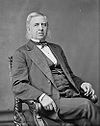 James E. English James E. EnglishJames E. English James Edward English was a United States Representative and Senator from Connecticut. He was born in New Haven and attended the common schools; later, he engaged in the lumber business, banking, and manufacturing. He was a member of the New Haven board of selectmen from 1847 to 1861, and a member... |
Democratic Democratic Party (United States) The Democratic Party is one of two major contemporary political parties in the United States, along with the Republican Party. The party's socially liberal and progressive platform is largely considered center-left in the U.S. political spectrum. The party has the lengthiest record of continuous... |
November 27, 1875 – May 17, 1876 |
Appointed to continue Ferry's term Retired when successor elected |
||
| 18 | 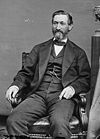 William Henry Barnum William Henry BarnumWilliam Henry Barnum William Henry Barnum was a United States politician, serving as a state representative, U.S. Representative, U.S. Senator, and finally as chairman of the Democratic National Committee... |
Democratic Democratic Party (United States) The Democratic Party is one of two major contemporary political parties in the United States, along with the Republican Party. The party's socially liberal and progressive platform is largely considered center-left in the U.S. political spectrum. The party has the lengthiest record of continuous... |
May 18, 1876 – March 4, 1879 |
44 44th United States Congress The Forty-fourth United States Congress was a meeting of the legislative branch of the United States federal government, consisting of the United States Senate and the United States House of Representatives. It met in Washington, D.C. from March 4, 1875 to March 4, 1877, during the seventh and... (Continued) |
Elected to finish Ferry's term | |
| 45 45th United States Congress -House of Representatives:-Leadership:-Senate:*President: William A. Wheeler *President pro tempore: Thomas W. Ferry -House of Representatives:*Speaker: Samuel J. Randall -Members:This list is arranged by chamber, then by state... |
||||||
| 19 | 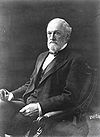 Orville H. Platt Orville H. PlattOrville H. Platt Orville Hitchcock Platt was a United States Senator from Connecticut. Born in Washington, Connecticut, he attended the common schools and graduated from The Gunnery in Washington. He studied law in Litchfield, and was admitted to the bar in 1850, commencing practice in Towanda, Pennsylvania... |
Republican Republican Party (United States) The Republican Party is one of the two major contemporary political parties in the United States, along with the Democratic Party. Founded by anti-slavery expansion activists in 1854, it is often called the GOP . The party's platform generally reflects American conservatism in the U.S... |
March 4, 1879 – April 21, 1905 |
46 46th United States Congress The Forty-sixth United States Congress was a meeting of the legislative branch of the United States federal government, consisting of the United States Senate and the United States House of Representatives. It met in Washington, D.C. from March 4, 1879 to March 4, 1881, during the last two years of... |
16 | Elected in 1879 |
| 47 47th United States Congress The Forty-seventh United States Congress was a meeting of the legislative branch of the United States federal government, consisting of the United States Senate and the United States House of Representatives. It met in Washington, D.C. from March 4, 1881 to March 4, 1883, during the administration... |
||||||
| 48 48th United States Congress The Forty-eighth United States Congress was a meeting of the legislative branch of the United States federal government, consisting of the United States Senate and the United States House of Representatives. It met in Washington, D.C. from March 4, 1883 to March 4, 1885, during the last two years... |
||||||
| 49 49th United States Congress The Forty-ninth United States Congress was a meeting of the legislative branch of the United States federal government, consisting of the United States Senate and the United States House of Representatives. It met in Washington, D.C. from March 4, 1885 to March 4, 1887, during the first two years... |
17 | Re-elected 1885 | ||||
| 50 50th United States Congress The Fiftieth United States Congress was a meeting of the legislative branch of the United States federal government, consisting of the United States Senate and the United States House of Representatives. It met in Washington, D.C. from March 4, 1887 to March 4, 1889, during the third and fourth... |
||||||
| 51 51st United States Congress The Fifty-first United States Congress, referred to by some critics as the Billion Dollar Congress, was a meeting of the legislative branch of the United States federal government, consisting of the United States Senate and the United States House of Representatives. It met in Washington, D.C... |
||||||
| 52 52nd United States Congress The Fifty-second United States Congress was a meeting of the legislative branch of the United States federal government, consisting of the United States Senate and the United States House of Representatives. It met in Washington, D.C... |
18 | Re-elected 1891 | ||||
| 53 53rd United States Congress The Fifty-third United States Congress was a meeting of the legislative branch of the United States federal government, consisting of the United States Senate and the United States House of Representatives. It met in Washington, D.C. from March 4, 1893 to March 4, 1895, during the fifth and sixth... |
||||||
| 54 54th United States Congress - House of Representatives :-Leadership:- Senate :* President: Adlai E. Stevenson * President pro tempore: William P. Frye - Majority leadership :* Republican Conference Chairman: John Sherman- Minority leadership :... |
||||||
| 55 55th United States Congress -House of Representatives:* Republican: 206 * Democratic: 124* Populist: 22* Silver Republican: 3* Silver: 1* Independent Republican: 1TOTAL members: 357-Leadership:-Senate:* President: Garret Hobart * President pro tempore: William P... |
19 | Re-elected 1897 | ||||
| 56 56th United States Congress -House of Representatives:- Leadership :- Senate :* President: Garret Hobart , until November 21, 1899 , vacant thereafter.* President pro tempore: William P. Frye * Democratic Caucus Chairman: James K. Jones... |
||||||
| 57 57th United States Congress -House of Representatives:*Democratic: 151*Republican: 200 *Populist: 5*Silver : 1TOTAL members: 357-Leadership:-Senate:* President: Theodore Roosevelt , until September 14, 1901, vacant thereafter.... |
||||||
| 58 58th United States Congress - House of Representatives :* Republican : 209 * Democratic : 176* Silver Republican : 1TOTAL members: 386-Senate:* President: Vacant* President pro tempore: William P. Frye -Members:... |
20 | Re-elected in 1903 Died |
||||
| Vacant | April 21, 1905 – May 10, 1905 |
|||||
| 20 | 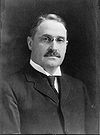 Frank B. Brandegee Frank B. BrandegeeFrank B. Brandegee Frank Bosworth Brandegee was a United States Representative and Senator from Connecticut.-Biography:He was born in New London, Connecticut to US Representative Augustus Brandegee.... |
Republican Republican Party (United States) The Republican Party is one of the two major contemporary political parties in the United States, along with the Democratic Party. Founded by anti-slavery expansion activists in 1854, it is often called the GOP . The party's platform generally reflects American conservatism in the U.S... |
May 10, 1905 – October 14, 1924 |
58 58th United States Congress - House of Representatives :* Republican : 209 * Democratic : 176* Silver Republican : 1TOTAL members: 386-Senate:* President: Vacant* President pro tempore: William P. Frye -Members:... (Continued) |
Elected to finish Platt's term | |
| 59 59th United States Congress The Fifty-ninth United States Congress was a meeting of the legislative branch of the United States federal government, composed of the United States Senate and the United States House of Representatives. It met in Washington, DC from March 4, 1905 to March 4, 1907, during the fifth and sixth... |
||||||
| 60 60th United States Congress The Sixtieth United States Congress was a meeting of the legislative branch of the United States federal government, composed of the United States Senate and the United States House of Representatives. It met in Washington, DC from March 4, 1907 to March 4, 1909, during the last two years of... |
||||||
| 61 61st United States Congress The Sixty-first United States Congress was a meeting of the legislative branch of the United States federal government, composed of the United States Senate and the United States House of Representatives. It met in Washington, DC from March 4, 1909 to March 4, 1911, during the first two years of... |
21 | Re-elected in 1908 United States Senate elections, 1908 Some states elected their Senators directly even before passage of the 17th Amendment in 1913. Oregon pioneered direct election and experimented with different measures over several years until it succeeded in 1907. Soon after, Nebraska followed suit and laid the foundation for other states to... |
||||
| 62 62nd United States Congress - House of Representatives :* Democratic : 230 * Republican : 162* Socialist : 1* Independent : 1TOTAL members: 394-Senate:* President: James S... |
||||||
| 63 63rd United States Congress - House of Representatives:*Democratic : 291 *Republican : 134*Progressive : 9*Independent : 1TOTAL members: 435-Senate:*President of the Senate: Thomas R. Marshall*President pro tempore: James P. Clarke-Senate:... |
||||||
| 64 64th United States Congress The Sixty-fourth United States Congress was a meeting of the legislative branch of the United States federal government, composed of the United States Senate and the United States House of Representatives. It met in Washington, DC from March 4, 1915 to March 4, 1917, during the third and fourth... |
22 | Re-elected in 1914 | ||||
| 65 65th United States Congress The Sixty-fifth United States Congress was a meeting of the legislative branch of the United States federal government, composed of the United States Senate and the United States House of Representatives. It met in Washington, DC from March 4, 1917 to March 4, 1919, during the fourth and fifth... |
||||||
| 66 66th United States Congress The Sixty-sixth United States Congress was a meeting of the legislative branch of the United States federal government, comprising the United States Senate and the United States House of Representatives. It met in Washington, DC from March 4, 1919 to March 4, 1921, during the last two years of... |
||||||
| 67 67th United States Congress The Sixty-seventh United States Congress was a meeting of the legislative branch of the United States federal government, consisting of the United States Senate and the United States House of Representatives. It met in Washington, D.C. from March 4, 1921 to March 4, 1923, during the first two years... |
23 | Re-elected in 1920 Died |
||||
| 68 68th United States Congress The Sixty-eighth United States Congress was a meeting of the legislative branch of the United States federal government, consisting of the United States Senate and the United States House of Representatives. It met in Washington, D.C. from March 4, 1923 to March 4, 1925, during the last months of... |
||||||
| Vacant | October 14, 1924 – December 15, 1924 |
|||||
| 21 |  Hiram Bingham III Hiram Bingham IIIHiram Bingham III Hiram Bingham, formally Hiram Bingham III, was an academic, explorer, treasure hunter and politician from the United States. He made public the existence of the Quechua citadel of Machu Picchu in 1911 with the guidance of local indigenous farmers... |
Republican Republican Party (United States) The Republican Party is one of the two major contemporary political parties in the United States, along with the Democratic Party. Founded by anti-slavery expansion activists in 1854, it is often called the GOP . The party's platform generally reflects American conservatism in the U.S... |
December 15, 1924 – March 4, 1933 |
68 68th United States Congress The Sixty-eighth United States Congress was a meeting of the legislative branch of the United States federal government, consisting of the United States Senate and the United States House of Representatives. It met in Washington, D.C. from March 4, 1923 to March 4, 1925, during the last months of... (Continued) |
Elected to finish Brandegee's term | |
| 69 69th United States Congress The Sixty-ninth United States Congress was a meeting of the legislative branch of the United States federal government, consisting of the United States Senate and the United States House of Representatives. It met in Washington, D.C. from March 4, 1925 to March 4, 1927, during the third and fourth... |
||||||
| 70 70th United States Congress The Seventieth United States Congress was a meeting of the legislative branch of the United States federal government, consisting of the United States Senate and the United States House of Representatives. It met in Washington, D.C. from March 4, 1927 to March 3, 1929, during the last two years of... |
24 | Re-elected in 1926 Lost re-election |
||||
| 71 71st United States Congress The Seventy-first United States Congress was a meeting of the legislative branch of the United States federal government, consisting of the United States Senate and the United States House of Representatives. It met in Washington, D.C. from March 4, 1929 to March 4, 1931, during the first two years... |
||||||
| 72 72nd United States Congress The Seventy-second United States Congress was a meeting of the legislative branch of the United States federal government, consisting of the United States Senate and the United States House of Representatives. It met in Washington, D.C. from March 4, 1931 to March 4, 1933, during the last two years... |
||||||
| 22 | 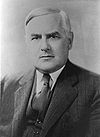 Augustine Lonergan Augustine LonerganAugustine Lonergan Augustine Lonergan , of Hartford, Connecticut, was a U.S. Representative from Connecticut from 1913 to 1915, 1917 to 1921, and from 1931 to 1933. He was also a U.S. Senator from Connecticut from 1933 to 1939. He was a Democrat.... |
Democratic Democratic Party (United States) The Democratic Party is one of two major contemporary political parties in the United States, along with the Republican Party. The party's socially liberal and progressive platform is largely considered center-left in the U.S. political spectrum. The party has the lengthiest record of continuous... |
March 4, 1933 – January 3, 1939 |
73 73rd United States Congress The Seventy-third United States Congress was a meeting of the legislative branch of the United States federal government, composed of the United States Senate and the United States House of Representatives. It met in Washington, DC from March 4, 1933 to January 3, 1935, during the first two years... |
25 | Elected in 1932 Lost re-election |
| 74 74th United States Congress -House:Also 2 Delegates, 3 Resident Commissioners-Senate:*President of the Senate: John N. Garner *President pro tempore: Key Pittman -Majority leadership:*Majority leader: Joseph T. Robinson... |
||||||
| 75 75th United States Congress The Seventy-fifth United States Congress was a meeting of the legislative branch of the United States federal government, composed of the United States Senate and the United States House of Representatives. It met in Washington, DC from January 3, 1937 to January 3, 1939, during the first two years... |
||||||
| 23 | 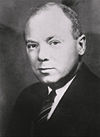 John A. Danaher John A. DanaherJohn A. Danaher John Anthony Danaher was a United States Senator from Connecticut.Born in Meriden, Connecticut, he attended the local schools and during the First World War served in the Student's Army Training Corps at Yale University and in the Officers' Reserve Corps... |
Republican Republican Party (United States) The Republican Party is one of the two major contemporary political parties in the United States, along with the Democratic Party. Founded by anti-slavery expansion activists in 1854, it is often called the GOP . The party's platform generally reflects American conservatism in the U.S... |
January 3, 1939 – January 3, 1945 |
76 76th United States Congress The Seventy-sixth United States Congress was a meeting of the legislative branch of the United States federal government, composed of the United States Senate and the United States House of Representatives. It met in Washington, DC from January 3, 1939 to January 3, 1941, during the seventh and... |
26 | Elected in 1938 Lost re-election |
| 77 77th United States Congress -Major events:* December 7, 1941: Attack on Pearl Harbor* December 8, 1941: Joint Session of Congress met to hear President Roosevelt deliver his "Day of Infamy" speech... |
||||||
| 78 78th United States Congress The Seventy-eighth United States Congress was a meeting of the legislative branch of the United States federal government, composed of the United States Senate and the United States House of Representatives. It met in Washington, DC from January 3, 1943 to January 3, 1945, during the last two years... |
||||||
| 24 | 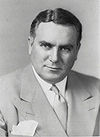 Brien McMahon Brien McMahonBrien McMahon Brien McMahon, born James O'Brien McMahon was an American lawyer and politician who served in the United States Senate from 1945 to 1952... |
Democratic Democratic Party (United States) The Democratic Party is one of two major contemporary political parties in the United States, along with the Republican Party. The party's socially liberal and progressive platform is largely considered center-left in the U.S. political spectrum. The party has the lengthiest record of continuous... |
January 3, 1945 – July 28, 1952 |
79 79th United States Congress The Seventy-ninth United States Congress was a meeting of the legislative branch of the United States federal government, composed of the United States Senate and the United States House of Representatives. It met in Washington, DC from January 3, 1945 to January 3, 1947, during the last months of... |
27 | Elected in 1944 |
| 80 80th United States Congress The Eightieth United States Congress was a meeting of the legislative branch of the United States federal government, composed of the United States Senate and the United States House of Representatives. It met in Washington, DC from January 3, 1947 to January 3, 1949, during the third and fourth... |
||||||
| 81 81st United States Congress The Eighty-first United States Congress was a meeting of the legislative branch of the United States federal government, composed of the United States Senate and the United States House of Representatives... |
||||||
| 82 82nd United States Congress The Eighty-second United States Congress was a meeting of the legislative branch of the United States federal government, composed of the United States Senate and the United States House of Representatives. It met in Washington, DC from January 3, 1951 to January 3, 1953, during the last two years... |
28 | Re-elected in 1950 Died |
||||
| Vacant | July 28, 1952 – August 29, 1952 |
|||||
| 25 |  William A. Purtell William A. PurtellWilliam A. Purtell William Arthur Purtell was an American politician from Connecticut. He was a veteran of the First World War and an unsuccessful candidate for the Republican nomination for governor in 1950... |
Republican Republican Party (United States) The Republican Party is one of the two major contemporary political parties in the United States, along with the Democratic Party. Founded by anti-slavery expansion activists in 1854, it is often called the GOP . The party's platform generally reflects American conservatism in the U.S... |
August 29, 1952 – November 4, 1952 |
Appointed to continue McMahon's term Retired when successor elected |
||
| 26 | 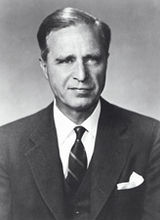 Prescott Bush Prescott BushPrescott Bush Prescott Sheldon Bush was a Wall Street executive banker and a United States Senator, representing Connecticut from 1952 until January 1963. He was the father of George H. W. Bush and the grandfather of George W... |
Republican Republican Party (United States) The Republican Party is one of the two major contemporary political parties in the United States, along with the Democratic Party. Founded by anti-slavery expansion activists in 1854, it is often called the GOP . The party's platform generally reflects American conservatism in the U.S... |
November 4, 1952 – January 3, 1963 |
82 82nd United States Congress The Eighty-second United States Congress was a meeting of the legislative branch of the United States federal government, composed of the United States Senate and the United States House of Representatives. It met in Washington, DC from January 3, 1951 to January 3, 1953, during the last two years... (Continued) |
Elected to finish McMahon's term | |
| 83 83rd United States Congress The Eighty-third United States Congress was a meeting of the legislative branch of the United States federal government, composed of the United States Senate and the United States House of Representatives. It met in Washington, DC from January 3, 1953 to January 3, 1955, during the first two years... |
||||||
| 84 84th United States Congress The Eighty-fourth United States Congress was a meeting of the legislative branch of the United States federal government, composed of the United States Senate and the United States House of Representatives. It met in Washington, DC from January 3, 1955 to January 3, 1957, during the third and... |
||||||
| 85 85th United States Congress The Eighty-fifth United States Congress was a meeting of the legislative branch of the United States federal government, composed of the United States Senate and the United States House of Representatives. It met in Washington, DC from January 3, 1957 to January 3, 1959, during the fifth and sixth... |
29 | Re-elected in 1956 Retired |
||||
| 86 86th United States Congress The Eighty-sixth United States Congress was a meeting of the legislative branch of the United States federal government, composed of the United States Senate and the United States House of Representatives. It met in Washington, DC from January 3, 1959 to January 3, 1961, during the last two years... |
||||||
| 87 87th United States Congress -House of Representatives :-Senate:* President: Richard Nixon , until January 20, 1961** Lyndon Johnson , from January 20, 1961* President pro tempore: Carl Hayden -House of Representatives:... |
||||||
| 27 | 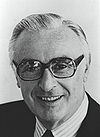 Abraham A. Ribicoff Abraham A. RibicoffAbraham A. Ribicoff Abraham Alexander Ribicoff was an American Democratic Party politician. He served in the United States Congress, as the 80th Governor of Connecticut and as President John F. Kennedy's Secretary of Health, Education, and Welfare... |
Democratic Democratic Party (United States) The Democratic Party is one of two major contemporary political parties in the United States, along with the Republican Party. The party's socially liberal and progressive platform is largely considered center-left in the U.S. political spectrum. The party has the lengthiest record of continuous... |
January 3, 1963 – January 3, 1981 |
88 88th United States Congress The Eighty-eighth United States Congress was a meeting of the legislative branch of the United States federal government, composed of the United States Senate and the United States House of Representatives. It met in Washington, DC from January 3, 1963 to January 3, 1965, during the last year of... |
30 | Elected in 1962 |
| 89 89th United States Congress -House of Representatives:- Senate :* President of the Senate: Hubert Humphrey , starting January 20, 1965* President pro tempore: Carl Hayden - Majority leadership :* Majority Leader and Democratic Conference Chairman: Mike Mansfield... |
||||||
| 90 90th United States Congress The Ninetieth United States Congress was a meeting of the legislative branch of the United States federal government, composed of the United States Senate and the United States House of Representatives. It met in Washington, DC from January 3, 1967 to January 3, 1969, during the last two years of... |
||||||
| 91 91st United States Congress The Ninety-first United States Congress was a meeting of the legislative branch of the United States federal government, composed of the United States Senate and the United States House of Representatives. It met in Washington, DC from January 3, 1969 to January 3, 1971, during the first two years... |
31 | Re-elected in 1968 | ||||
| 92 92nd United States Congress The Ninety-second United States Congress was a meeting of the legislative branch of the United States federal government, composed of the United States Senate and the United States House of Representatives... |
||||||
| 93 93rd United States Congress The Ninety-third United States Congress was a meeting of the legislative branch of the United States federal government, composed of the United States Senate and the United States House of Representatives. It met in Washington, DC from January 3, 1973 to January 3, 1975, during the end of Richard... |
||||||
| 94 94th United States Congress The Ninety-fourth United States Congress was a meeting of the legislative branch of the United States federal government, composed of the United States Senate and the United States House of Representatives. It met in Washington, DC from January 3, 1975 to January 3, 1977, during the administration... |
32 | Re-elected in 1974 Retired |
||||
| 95 95th United States Congress The Ninety-fifth United States Congress was a meeting of the legislative branch of the United States federal government, composed of the United States Senate and the United States House of Representatives. It met in Washington, DC from January 3, 1977 to January 3, 1979, during the first two years... |
||||||
| 96 96th United States Congress The Ninety-sixth United States Congress was a meeting of the legislative branch of the United States federal government, composed of the United States Senate and the United States House of Representatives. It met in Washington, DC from January 3, 1979 to January 3, 1981, during the last two years... |
||||||
| 28 | 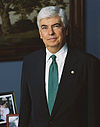 Chris Dodd Chris Dodd |
Democratic Democratic Party (United States) The Democratic Party is one of two major contemporary political parties in the United States, along with the Republican Party. The party's socially liberal and progressive platform is largely considered center-left in the U.S. political spectrum. The party has the lengthiest record of continuous... |
January 3, 1981 – January 3, 2011 |
97 97th United States Congress The Ninety-seventh United States Congress was a meeting of the legislative branch of the United States federal government, composed of the United States Senate and the United States House of Representatives. It met in Washington, DC from January 3, 1981 to January 3, 1983, during the final weeks of... |
33 | Elected in 1980 United States Senate elections, 1980 The 1980 U.S. Senate elections coincided with Ronald Reagan's election to the Presidency. Reagan's large margin of victory over incumbent Jimmy Carter pulled in many Democratic voters and gave a huge boost to Republican senate candidates.... |
| 98 98th United States Congress The Ninety-eighth United States Congress was a meeting of the legislative branch of the United States federal government, composed of the United States Senate and the United States House of Representatives. It met in Washington, DC from January 3, 1983 to January 3, 1985, during the third and... |
||||||
| 99 99th United States Congress The Ninety-ninth United States Congress was a meeting of the legislative branch of the United States federal government, composed of the United States Senate and the United States House of Representatives. It met in Washington, DC from January 3, 1985 to January 3, 1987, during the fifth and sixth... |
||||||
| 100 100th United States Congress -House of Representatives:- Senate :* President: George H.W. Bush * President pro tempore: John Stennis - Majority leadership :* Majority Leader, Democratic Conference Chairman, and Democratic Policy Committee Chairman: Robert Byrd... |
34 | Re-elected in 1986 United States Senate elections, 1986 The U.S. Senate election, 1986 was an election for the United States Senate in the middle of Ronald Reagan's second presidential term. As in most midterm elections, the opposition Democratic Party held the usual advantage... |
||||
| 101 101st United States Congress The One Hundred First United States Congress was a meeting of the legislative branch of the United States federal government, composed of the United States Senate and the United States House of Representatives. It met in Washington, DC from January 3, 1989 to January 3, 1991, during the first two... |
||||||
| 102 102nd United States Congress -House of Representatives:- Senate :* President:Dan Quayle * President pro tempore: Robert Byrd - Majority leadership :* Majority Leader: George Mitchell* Majority Whip: Wendell Ford- Minority leadership :... |
||||||
| 103 103rd United States Congress - House of Representatives :- Leadership :- Senate :* President: Dan Quayle , until January 20, 1993** Al Gore , from January 20, 1993* President pro tempore: Robert Byrd - Majority leadership :* Majority Leader: George Mitchell... |
35 | Re-elected in 1992 United States Senate elections, 1992 The 1992 United States Senate election was an election for the United States Senate in which the victory of Bill Clinton in the presidential election was not accompanied by major Democratic gains in the Senate.... |
||||
| 104 104th United States Congress The One Hundred Fourth United States Congress was a meeting of the legislative branch of the United States federal government, composed of the United States Senate and the United States House of Representatives. It met in Washington, DC from January 3, 1995 to January 3, 1997, during the third and... |
||||||
| 105 105th United States Congress The One Hundred Fifth United States Congress was a meeting of the legislative branch of the United States federal government, composed of the United States Senate and the United States House of Representatives. It met in Washington, DC from January 3, 1997 to January 3, 1999, during the fifth and... |
||||||
| 106 106th United States Congress The One Hundred Sixth United States Congress was a meeting of the legislative branch of the United States federal government, composed of the United States Senate and the United States House of Representatives. It met in Washington, DC from January 3, 1999 to January 3, 2001, during the last two... |
36 | Re-elected in 1998 United States Senate election in Connecticut, 1998 The 1998 United States Senate election in Connecticut took place on November 3, 1998 alongside other elections to the United States Senate in other states as well as elections to the United States House of Representatives and various state and local elections. Incumbent Democrat U.S. Senator Chris... |
||||
| 107 107th United States Congress The One Hundred Seventh United States Congress was a meeting of the legislative branch of the United States federal government, composed of the United States Senate and the United States House of Representatives. It met in Washington, D.C. from January 3, 2001 to January 3, 2003, during the final... |
||||||
| 108 108th United States Congress The One Hundred Eighth United States Congress was the legislative branch of the United States federal government, composed of the United States Senate and the United States House of Representatives from January 3, 2003 to January 3, 2005, during the third and fourth years of George W. Bush's... |
||||||
| 109 109th United States Congress The One Hundred Ninth United States Congress was the legislative branch of the United States, composed of the United States Senate and the United States House of Representatives, from January 3, 2005 to January 3, 2007, during the fifth and sixth years of George W. Bush's presidency. House members... |
37 | Re-elected in 2004 United States Senate election in Connecticut, 2004 The 2004 United States Senate election in Connecticut took place on November 2, 2004 alongside other elections to the United States Senate in other states as well as elections to the United States House of Representatives and various state and local elections. Incumbent Democrat U.S... Retired |
||||
| 110 110th United States Congress The One Hundred Tenth United States Congress was the meeting of the legislative branch of the United States federal government, between January 3, 2007, and January 3, 2009, during the last two years of the second term of President George W. Bush. It was composed of the Senate and the House of... |
||||||
| 111 111th United States Congress The One Hundred Eleventh United States Congress was the meeting of the legislative branch of the United States federal government from January 3, 2009 until January 3, 2011. It began during the last two weeks of the George W. Bush administration, with the remainder spanning the first two years of... |
||||||
| 29 | Richard Blumenthal Richard Blumenthal Richard Blumenthal is the junior United States Senator from Connecticut and a member of the Democratic Party. Previously, he served as Attorney General of Connecticut.... |
Democratic Democratic Party (United States) The Democratic Party is one of two major contemporary political parties in the United States, along with the Republican Party. The party's socially liberal and progressive platform is largely considered center-left in the U.S. political spectrum. The party has the lengthiest record of continuous... |
January 3, 2011 – Present |
112 112th United States Congress The One Hundred Twelfth United States Congress is the current meeting of the legislative branch of the United States federal government, composed of the United States Senate and the United States House of Representatives. It convened in Washington, D.C. on January 3, 2011, and will end on January... |
38 | Elected in 2010 United States Senate election in Connecticut, 2010 The 2010 United States Senate election in Connecticut was a midterm election which took place on November 2, 2010 to decide a Class III Senator from the State of Connecticut to join the 112th United States Congress. Incumbent Democratic U.S... |
| 113 113th United States Congress The One Hundred Thirteenth United States Congress will be the next meeting of the legislative branch of the United States federal government after the 112th Congress is seated. It will be composed of the United States Senate and the United States House of Representatives. It is scheduled to meet... |
||||||
| 114 | ||||||
| # | Senator | Party | Years | Congress | Term | Electoral history |
See also
- List of United States Representatives from Connecticut
- United States congressional delegations from ConnecticutUnited States Congressional Delegations from ConnecticutThese are tables of congressional delegations from Connecticut to the United States Senate and United States House of Representatives.-United States Senate:-Passages:- House of Representatives :...

